#historian: andy king
Explore tagged Tumblr posts
Text
At the highest social levels, there were the kings eldest sons (Henry and Thomas) who served with small retinues although they were only twelve and eleven years old, respectively. Although the princes were clearly too young to exercise effective command over large bodies of soldiers, there could not have been a better way of emphasising to both the English and their Scottish enemy the stability, and indeed virility, of the new regime than the king leading out an army alongside his two eldest sons, in succession to the childless Richard II. The symbolic value of such a formation would not have been lost on the king, but nor would the need to bolster the princes' divisions with men of high status and greater military experience, or at least greater age. In the groupings of Curson's particulars, Thomas of Lancaster is placed with the earl of Rutland, Walter, Lord Fitzwalter, and Richard, Lord Grey of Codnor. Meanwhile, Prince Henrys group contained units led by Edmund, earl of Stafford and William, Lord Ferrers of Groby, plus the 244 men-at- arms mustered by the treasurer and controller of the royal household, Thomas Tutbury and Robert Litton
Anne Curry, Adrian R. Bell, Andy King and David Simpkin, "New Regime, New Army? Henry IV's Scottish Expedition of 1400", The English Historical Review, Vol. 125, No. 517 (2010)
#imagine being 11 and 12 and being sent off to war for your father's sucky campaign#12 year old hal sitting there like: this is worse than richard's irish campaign#(actually i think they would have been 13 and 12 not 12 and 11)#henry iv#henry v#thomas duke of clarence#edward 2nd duke of york#walter lord fitzwalter#richard lord grey of codnor#edmund stafford earl of stafford#william lord ferrers of groby#thomas tutbury#robert litton#1400 scottish expedition#historian: anne curry#historian: adrian r. bell#historian: andy king#historian: david simpkin
9 notes
·
View notes
Text

Andy Warhol getting called out by Sister Wendy is basically an art historian version of Godzilla vs King Kong.
That nun was angry.

10 notes
·
View notes
Text
The Story of Christian Louboutin’s Red Sole
DATE: 07/15/2022
What if I told you that the story of Christian Louboutin’s red sole started with…nail polish? With simple beginnings in 1991, Louboutin was about to launch a trademark look for the fashion industry, and it came from simple inspiration—and a little luck. Here’s the story behind Louboutin’s red sole, plus a few more reasons to love his heels as much as I do!
What inspired the red heel?
Tell the truth: when you catch a flash of Christian Louboutin’s trademark red sole while, say, out for a walk, what images pop into your head? Luxury? Royalty? Riches? Well it makes sense, since red heels have quite the royal history, dating back to French monarchy and in particular, King Louis XIV.
As the story goes, Louis’ younger brother Philippe d’Orléans – who for some reason was raised as a girl – was out walking the streets of Paris when his heels became stained with a red color. Attracted as he was to the look, he went home and is said to have painted all his heels red, only for his older brother to adopt the style himself.
Soon, the red heel would gain a permanent place in history thanks to Louis’ own narcissism, which saw him pass an edict that meant only nobility could wear heels, and only allowed those in his favor to wear red heels at that—apparently, the higher the heel, the more favored the wearer.
In fact, according to Philip Mansel – a historian with knowledge on the subject – the color red “demonstrate[d] that the nobles did not dirty their shoes”, and impressed upon the lower classes the idea that noble-persons “were always ready to crush the enemies of the State at their feet.”
Not that it lasted—soon the style fell out of fashion with the French Revolution and Marie Antoinette’s beheading, where she has been recorded as wearing a pair 2-inch heels to the guillotine.
While red heels had become unpopular for some time afterward – so much so that the phrase “red-heeled” was for a while considered derogatory in the UK – we know now that this ‘royal’ and dramatic history has nothing to do with how Christian Louboutin came to build his brand identity around the eye-popping red sole we know today!
Red Soles and Nail Polish
In 1993, after being in business for two years, it is said that Christian Louboutin released his latest collection of shoes a few weeks late. The idea had been to create a shoe inspired by close acquaintance (and party buddy) Andy Warhol’s painting, Flowers—and yet when the prototype arrived from Italy, there was something missing.
Certainly, the pink-stacked heel and large cloth blossom looked like the design Louboutin had drawn, and yet according to the designer, “the drawing was still stronger and I could not understand why.”
Enter, the red sole of fate! Looking around for inspiration, the blank, black sole of the shoe staring at him in the face, Louboutin noticed an assistant in his office painting her fingernails red. Without asking – so we can assume – Louboutin grabbed the bottle of red varnish, polished the sole of one of the shoes and thought: “This is the drawing!”
So were Louboutin’s red soles born!
When, in the years since, Christian has been asked about the importance of the red sole, he has been quoted as saying, “The shiny red color of the soles has no function other than to identify to the public that they are mine. I selected the color because it is engaging, flirtatious, memorable, and the color of passion.”
Louboutin is certainly known to be passionate about his red soles, which he registered in 1997 with the U.S. Patent and Trademark Office—a move that would later come in handy in a court case against Yves St. Laurent when the design house delivered a collection featuring their own version of Louboutin’s red soles.
Thanks to the existing popularity of the heel, and because of the drama which ensued when YSL was accused of copying Louboutin’s signature, today Louboutin’s red soles are as iconic to his brand as Chanel’s interlocking C’s—and only come in one shade: Pantone 18-1663 TPX.

0 notes
Text
New Post has been published on Andy Bondurant
New Post has been published on https://andybondurant.com/2023/05/23/contemplation-god-in-culture/
Contemplation: God in Culture
Years ago, while sitting in a movie theater watching The Lion King, I had a profound experience of encountering God. The opening credits, accompanied by cinematic brilliance, set the stage for a powerful narrative of kingship, family, and the land they rule. As the heavens opened to shine upon the newborn prince, I found myself immersed in the spiritual practice of contemplation. In this blog post, we will explore the concept of contemplation, specifically focusing on seeing God in the culture that surrounds us.
There are three typical ways we contemplate God:
Through culture.
Through creation.
Through our own world.
Contemplation through Culture in Scripture
When I saw God during The Lion King, I contemplated God through culture. For some people this is a foreign idea — God at work in the things created by non-believers? But we see this in Scripture. The most famous example of this is Paul visiting the city of Athens in Acts 17.
Paul sees God embedded in culture.
The leaders of Athens invited Paul to speak in front of the city at the famous Aeropagus. It was the center of thought, creative thinking and new ideas. It was an honor and an opportunity for Paul. He begins his talk like this:
“Men of Athens, I notice that you are very religious in every way, for as I was walking along I saw your many shrines. And one of your altars had this inscription on it: ‘To an Unknown God.’ This God, whom you worship without knowing, is the one I’m telling you about.”
Acts of the Apostles 17:22-23 NLT
Paul, standing before some of the intellectual giants of the day, uses their own culture to point out God to them. Now here is an important question to ask, so we can have this same impact on our own world: How did Paul prepare himself use the culture around him to see and be God to the Athenian people?
Image by Jay on UnSplash
Paul began the process as he walked the city alone with God.
“While Paul was waiting for them in Athens, he was deeply troubled by all the idols he saw everywhere in the city.”
Acts of the Apostles 17:16 NLT
Paul had just been run out of the city of Berea, and he was forced to wait for his co-workers Silas and Timothy. He didn’t waste the time and anonymity given to him. Paul walked the city taking in its culture. Scripture tells us he was troubled by what he saw. Paul used this agitation in his spirit to talk to God about what he saw. He meditated and prayed about it. He compared what he saw to the scriptures.
This is contemplation. As Paul thought about all he was seeing, God pointed him toward the tomb marked for an “Unknown God.” God opened Paul’s eyes to the fact that God had hidden himself within the culture and within the heart of every man. It was Paul’s job to point it out to the Athenians. In other words, Paul was to ‘be’ God to the people of Athens.
Paul sees God in pop culture
Paul saw more than just that tomb in their culture. In his talk Paul goes on to say:
““His purpose was for the nations to seek after God and perhaps feel their way toward him and find him—though he is not far from any one of us. For in him we live and move and exist. As some of your own poets have said, ‘We are his offspring.’ And since this is true, we shouldn’t think of God as an idol designed by craftsmen from gold or silver or stone.”
Acts of the Apostles 17:27-29 NLT (emphasis mine)
Some historians have compared the ancient lyrical poets to pop stars of today. These poets were invited to perform at dinner parties and festivals. Paul used their popularity to his advantage. First, Paul was not unaware of them or their messages (see God in culture). Second, Paul let them help make his point (be God to the world).
Just like God placed Paul within the Greco-Roman culture of his day, God has placed us within this Western/multi-cultural world. Paul used that opportunity to contemplate God. Are you contemplating God in culture?
In Culture, Not of Culture
Followers of Jesus tend to fall into one of two camps when it comes to culture. We either reject culture out of fear, or we immerse ourselves in culture, become desensitized and miss God altogether. God doesn’t want us to live in either of these two extremes. Our goal should be to walk the fine balance of that old saying, “be in the world not of the world.”
First, let’s analyze the two negative ways of dealing with culture. Culture in and of itself is not evil. In fact, culture is based on the principles God has created. Let’s take the top movies of 1994 as an example.
The top two movies of 1994, based on box office gross, were Forest Gump and The Lion King. That same year dozens of movies, if not hundreds, were released to the world. The tenth most popular movie of that year was Interview with a Vampire which grossed $99M. Forest Gump and The Lion King nearly tripled those numbers. Each of those two movies doubled the third movie on the list, the Arnold Schwarzenegger film True Lies. To date, combined, the Forest Gump and The Lion King have made over $2B!
Why? What made those two films so wildly successful during the year they were released and in the 30 years since?
God is the creator of culture
God is the creator of stories. His stories tell beautiful and compelling narratives. Forest Gump and The Lion King were runaway successes because the very essence of God is baked with them — a beautiful, well told story.
The Bible is an example of this. It’s God’s creative and compelling story of the redemption of his creation for his glory. The Bible contains stories of heartache, intrigue, and beauty. It is a book full of twists and turns. There is a reason it is both the best selling book of all time.
Your life is an example of this too. God is telling a creative and compelling story through the heartache and triumph you have experienced. It may not have the storyline of Forest Gump, but the feelings are just as real for you in the moment to experience it.
Just like most things, the fall of man wrestled story away from God, but the principles of a great story still point us to God. Great stories have a redemption arch. Beautiful stories are full of heartache and intrigue. We shouldn’t be afraid of the beauty in culture because God has created it. Our job is to wrestle it back from an evil purpose. Sometimes this means making our own stories – through film, art, music, literature. Other times it means seeing God in what those who don’t follow Jesus create. In both cases our ultimate job is to use culture to point people to Jesus.
Everyone is a disciple.
However we don’t want to be so immersed in the culture that we miss God altogether. It’s easy to use contemplation as an excuse to dive headfirst into culture only to find ourselves drowning in the thing we want to rescue. Or we discount the danger that the anti-God nature culture holds.
A great way to analyze this is through the context of discipleship. Someone or something disciples all of us. In other words, something or someone is growing you as a person. Are you growing in the values of God through his word, other believers, mentors, worship, etc? Are you growing in the values of culture through any number of media channels?
Here’s a great barometer for yourself: Where is your free time going? Where you spend your free time is shaping who you are. If your time is spent on social media, cable news, or unbelieving friends they are shaping your walk with God. If you use your time to be in Scripture, with Christian friends and meditating on God you are growing as a follower of Jesus.
Transformed not Conformed
In Romans 12, Paul gives us a useful way of dealing with this tension of being in the world but not of it.
“And so, dear brothers and sisters, I plead with you to give your bodies to God because of all he has done for you. Let them be a living and holy sacrifice—the kind he will find acceptable. This is truly the way to worship him. Don’t copy the behavior and customs of this world, but let God transform you into a new person by changing the way you think. Then you will learn to know God’s will for you, which is good and pleasing and perfect.”
Romans 12:1-2 NLT
The NIV uses the words conformed and transformed. We shouldn’t be so immersed in culture that we are conformed to its ways of thinking. We counterbalance this by bathing our minds in the things of God, and this transforms our minds.
At the same time, Paul doesn’t tell us to run from the world. He’s clear on this point in 1 Corinthians 5:
“When I wrote to you before, I told you not to associate with people who indulge in sexual sin. But I wasn’t talking about unbelievers who indulge in sexual sin, or are greedy, or cheat people, or worship idols. You would have to leave this world to avoid people like that.”
1 Corinthians 5:9-10 NLT
I can’t be sure, but my guess is you aren’t called to become a monk retreating from culture. We are to engage with culture without letting ourselves be conformed the culture around us.
How to Contemplate in Culture
It’s clear through Paul’s actions and Paul’s writing we are to contemplate God within culture. So how do we do it? Here are three tips:
1. Ask God to open your eyes.
I’ve made it a practice as I meditate in the morning to ask the Holy Spirit to fill me fresh for the day. As part of this process, I ask him to open my eyes and ears to see and hear him throughout the day. A great first step to seeing God in culture is asking him to reveal himself to you.
2. Train yourself to see God in culture.
For many of us, we’ve learned to compartmentalize the secular and the sacred. We have taught ourselves to that God belongs in their box, and the world belongs in a different box. We need to train ourselves to see God doesn’t remove himself from either box.
When you watch a movie, listen to a song, read a book or consider a piece of art ask yourself where you see God. Here are some common themes you’ll see in art – redemption, love, and a search for truth among many others. All of these are basic principles of how God operates. This is seeing God in culture.
3. Share what you see with others.
Contemplation isn’t just seeing God in culture, it is using what we see to be God to the world around us. So when you are having a conversation about the latest movie, television show, book or song with friends, share how you saw God or His principles in that creation.
God is the original creator. God embeds himself into our creations. Do you see God in the culture around you?
0 notes
Text
4K Ultra HD Review: God Told Me To
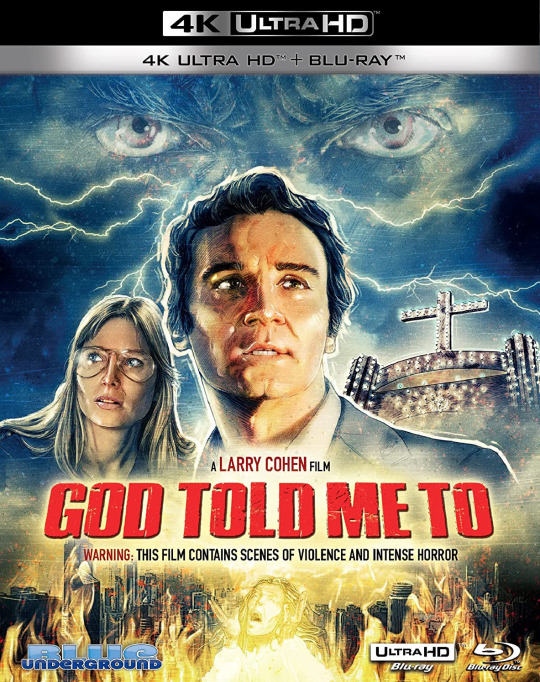
If God Told Me To were made today, its mass killing sprees would likely be approached in a less exploitative manner, and the guerrilla filmmaking style certainly couldn't be accomplished at the same scale (more on that later). But — with the proliferation of gun violence, conspiracy theories, and religious zealotry — the concept is every bit as potent now, if not even more so, than it was upon its original release in 1976.
The first two-thirds of the film might lead a viewer to believe it's one of writer-director Larry Cohen's more straightforward efforts — a police procedural thriller with psychological underpinnings — but the wildly unpredictable third act reveal immediately repositions it as perhaps Cohen's most bizarre outing. That's saying a lot, considering his delightfully delirious work on the likes of The Stuff, It’s Alive, and Q: The Winged Serpent.
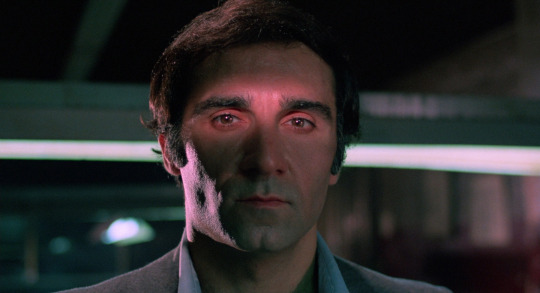
God Told Me To opens with a sniper picking people off in the middle of New York City from high atop a water tower with astonishing accuracy. NYPD detective Peter Nicholas (Tony Lo Bianco, The French Connection) takes it upon himself to climb up and speak with the shooter. The nonchalant explanation for his heinous actions — "God told me to" — followed by the leap to his death leaves Peter chilled.
This incident is followed by several more killing sprees that end in the same confession, including one reminiscent of a key scene in The Dark Knight: a police officer (Andy Kaufman, in his film debut) marching in a parade opens fire on the crowd. The fast-paced first act gives little indication of the aberration that follows, as Peter’s investigation leads him to learn that it’s a force other than God causing these people to commit such atrocities. I won’t give it away here, as it truly has to be seen to be believed, but it involves a gratuitous close-up of a fake vagina.
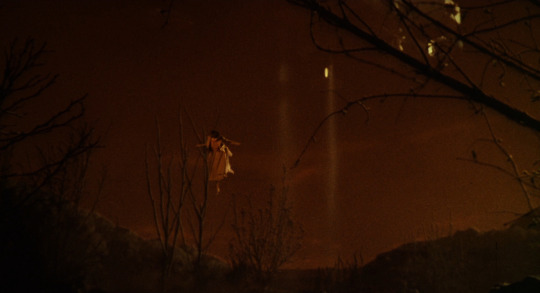
Cohen is an audacious filmmaker in every sense of the word. He’s fearless in his approach to offbeat material; in this case, an unclassifiable amalgam of crime thriller, science fiction, subversive exploitation, and religious horror that would make an interesting double feature with John Carpenter's Prince of Darkness. He’s equally intrepid with his filmmaking. He "stole" many of the New York City shots — including a volatile confrontation at the city’s actual St. Patrick's Day Parade — without permits; a miraculous feat that could never be accomplished in a post-9/11 world.
Lo Bianco is a treat as the lead, committed to the peculiar material as if it were Shakespeare. Oscar winner Sandy Dennis (Who’s Afraid of Virginia Woolf?) plays his wife, while Deborah Raffin (Death Wish 3) receives a guest starring credit as Peter’s mistress. Sylvia Sidney (Beetlejuice) and Richard Lynch (Halloween (2007)) each take on pivotal roles later in the film. Mike Kellin (Sleepaway Camp), George Patterson (I Drink Your Blood), and character actor Robert Nichols (The Thing from Another World) pop up in small parts as well.

God Told Me To has been newly restored in 4K from an original, uncensored negative with Dolby Vision HDR as well as Dolby Atmos and DTS-HD Master Audio options by Blue Underground. The transfer retains the marvelous grain synonymous with ‘70s genre pictures (doubly so for the gritty New York setting) coupled with high-definition clarity with improved contrast and saturation. The new transfer is included on both 4K UHD and Blu-ray. Only one new special feature was produced, but all of the extra's from Blue Underground's 2015 Blu-ray are accounted for.
King Cohen director Steve Mitchell and film historian Troy Howarth sit down for a new audio commentary. Mitchell's time spent documenting Cohen’s career proves to be indispensable, supplemented by Howarth's astute observations about the film. Also included is Cohen’s original commentary from the 2003 DVD release, moderated by his old friend William Lustig (Maniac Cop, Maniac), which makes for a great listen as well.

Other special features include: an interview with Lo Bianco, who flexes his remarkable memory as he recounts stories from nearly 40 years ago like they were yesterday; an interview with special effects artist Steve Neill (Ghostbusters), who built the aforementioned genitalia for his first gig; a 2014 Q&A with Cohen at a Los Angeles screening with no shortage of fun anecdotes; a 2002 Q&A with Cohen at a New York screening, wherein he reflects on how different it is to watch the film after 9/11; two theatrical trailers (one of which is under its alternate title, Demon); seven TV spots; and a gallery of posters and stills.
God Told Me To will be released on 4K Ultra HD/Blu-ray on July 19 via Blue Underground.
#god told me to#larry cohen#tony lo bianco#horror#70s horror#1970s horror#blue underground#dvd#review#article#gift#andy kaufman#sandy dennis#deborah raffin#richard lynch
14 notes
·
View notes
Text
Slashers / Horror Villains as: Animated (Children’s) Movie Villain Songs
+ A Nightmare Before Christmas
First of all, its mostly Disney. Second of all, I hope you know that this was a struggle for me.
Also, note, Bubba will be the only Leatherface in this post and Billy and Stu will be the only Ghostfaces. There is Norma Bates though, so sort of a consolation.
There are links to videos on YouTube ^^
~~~
Billy Loomis and Stu Macher / Ghostface: Playing With the Big Boy’s Now (Hotep and Huy, Prince of Egypt)

Well... they’re part of the ‘big boys’, now! They are part of the Slashers group that, uh, ‘inspired them’. Imagine instead of Egyptian Gods, they’re chanting Slasher names.
[HUY] Pick up your silly twig, boy [HOTEP & HUY] You're playing with the big boys now! Ha ha ha ha!
[EGYPTIAN PRIESTS] By the power of Ra Mut, Nut, Khnum, Ptah Sobek, Sekhmet, Sokar, Selket Anubis, Anukis Hemsut, Tefnut, Meshkent, Mafdet...
Chop Top and Nubbins + Bubba Sawyer / Leatherface: Kidnap Mr Sandy Claws (Lock, Shock and Barrel, Nightmare Before Christmas)
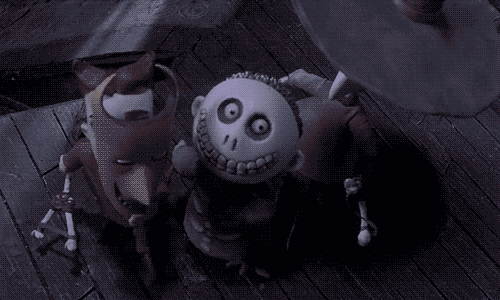
I mean... they aren't Drayton’s minions, but they are like this XD
I say that we take a cannon, aim it at his door And then knock three times And when he answers Sandy Claws will be no more
Yes you're so stupid, think now If we blow him up to smithereens We may lose some pieces And then Jack will beat us black and green
Kidnap the Sandy Claws Tie him in a bag
Chucky / Charles Lee Ray: In The Dark Of The Night (Rasputin, Anastasia)
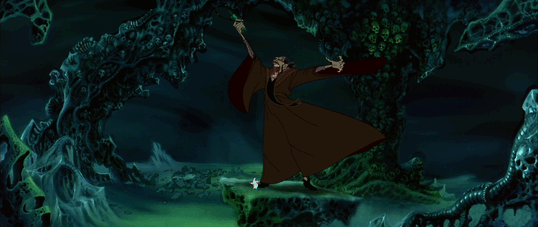
Mystical man? Check! ‘Betrayal’ (As far as he sees it)? Check. Made them pay? Check; I think Nica, Sarah and all the other families he destroys throughout the franchise can attest to that. And ‘One little girl got away’? Well Andy isn’t a girl, but yeah. Check.
I was once the most mystical man in all Russia When the royals betrayed me they mad a mistake My curse made each of them pay But one little girl got away Little Anya, beware Rasputin's awake
Drayton Sawyer: Don’t Fall In Love (Forte, Beauty and the Beast: The Enchanted Christmas)

Its such a crochety, unessessarily rude way of describing relationships to someone! I mean, I understand completely and resonate deeply with the desire to be alone and not be responsible for anyone else, but- come on! Beast doesn't share your view! Let it go!
Its just like Drayton’s reaction to Bubba having a crush. Super cool video too!
As soon as your heart rules your head Your life is not your own It's hell when someone's always there It's bliss to be alone
And love of any kind is bad A dog, a child, a cat They take up so much precious time Now, where's the sense in that?
Freddy Krueger: No More Mr Nice Guy (Rothbart, Swan Princess)

A man with an uncomfortable relationship with the main female character pretending to be normal and not homicidal for a while before unlocking more power and letting there inner bad guy loose and taking great pleasure in it? Sounds familiar. They also have a similar vocabulary- except of course Rothbart is rated G.
I'll become that nasty, naughty, dirty, spiteful Wicked, wayward, way-delightful Bad guy I was born to be
Lyin' loathesome, never-tender Indiscreet repeat offender No more Mr Nice Guy That's not me
Inkubus: The World’s Greatest Criminal Mind (Professor Rattigan, The Greatest Mouse Detective)
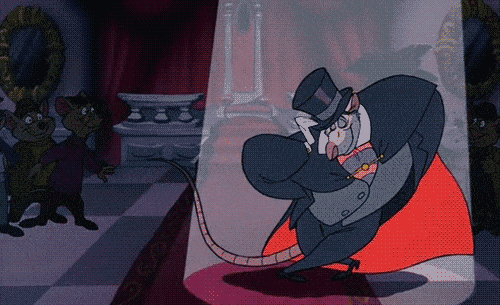
‘Inkubus’ is literally a movie about him listing all his crimes over the centuries and messing with the police force because he has a bone to pick with a detective. Sounds pretty similar to me! Listen to the song! ^^
Now comes the real tour de force Tricky and wicked, of course! My earlier crimes were fine for their times But now that I'm at it again An even grimmer plot has been simmering In my great criminal brain!
Jason Voorhees: Despicable Me (About Gru, Despicable Me)

I... this is all I could think of!! But the more I listen to it and read the lyrics... it f i t s Jason so well! XD Please just let this slide; I know Gru isn't really a villain but he is at the start!! Let me have this.
Why ask why? Better yet "Why not?" Why are you marking x on that spot? Why use a blow torch isn't that hot? Why use a chainsaw? Is that all you got? Why do you like seeing people in shock? But my question to you is "Why not?" Why go to the bank and stand in line Just use a freeze gun it saves me time. I'm havin' a bad, bad day It's about time that I get my way Steam rollin' whatever I see, Huh, despicable me I'm havin' a bad, bad day If you take it personal that's okay Watch, this is so fun to see Huh, despicable me
Jennifer Check: Trust In Me (Kaa, The Jungle Book)

She’s a succubus demon. Tempting boys into a safe-feeling, docile state so she she can strike is her thing.
Will cease to resist Just relax Be at rest Like a bird In a nest
Trust in me Just in me Shut your eyes And trust in me
Mayor Buckman and Granny Boone: Savages (Governor Ratcliffe and the Colonizer’s parts, Pocahontas)
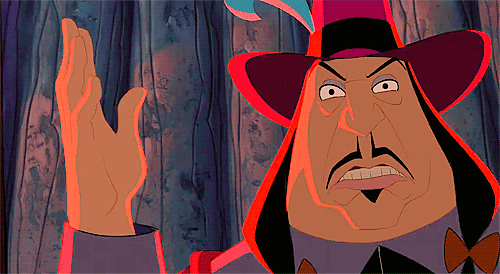
Obviously, because of the (Inaccurate) historical relevance of both movies (Different time’s, same terrible prejudice,) and also because there is definitely a very cult-ish feel about both Governor Ratcliffe’s song and Buckman’s leadership. How easily they’re able to gather support from their people for the most horrible reasons. How horrifying it is to audiences and historians.
They're only good when dead They're vermin, as I said And worse
They're savages! Savages!
Barely even human
Savages! Savages!
Drive them from our shore! They're not like you and me Which means they must be evil We must sound the drums of war!
Michael Myers: The Gospel Truth II (Muses about Hades, Hercules)

In a Disney movie, Michael would have others sing his song about him as he goes about his silent, determined walking XD
If there's one God you don't want to get steamed up It's Hades 'Cause he had an evil plan He ran the underworld But thought the dead were dull and uncouth He was as mean as he was ruthless And that's the gospel truth He had a plan to shake things up And that's the gospel truth
Midnight Man: Oogie Boogie’s Song (Oogie Boogie, Nightmare Before Christmas)

A song about a “Gamblin’ Boogie Man” is perfect for the Midnight Man! He and Oogie could be pals.
Woah! The sound of rollin' dice To me is music in the air 'Cause I'm a gamblin' Boogie Man Although I don't play fair It's much more fun, I must confess When lives are on the line Not mine, of course, but yours, old boy Now that'd be just fine
Norma Bates: Mother Knows Best Reprise (Mother Gothel, Tangled)

Norma is soooooo so so so unbelievably manipulative towards Norman (And Dylan. It just works better on Norman) and this song absolutely presents that. She can go from sweet, loving mother to spiteful, heinous bitch in two seconds if Norman or Dylan don't do what or react the way she wants them to.
Likes you? Please, Rapunzel, that's demented
This is why you never should have left! Dear, this whole romance that you've invented, Just proves you're too naive to be here Why would he like you? Come on now, really! Look at you, you think that he's impressed? Don't be a dummy Come with mummy
Pamela Voorhees: My Lullaby (Zira, The Lion King 2)


In a opposite approach to a villainous mother to Norma, we have Pam, who was heartbroken by the camp councillors letting her son die and vowed to get revenge. She didn't know she was teaching Jason to be the Crystal Lake killer like Zira did, but she did, and the whole song does have her kind of feel to it also.
Sleep, my little Kovu Let your dreams take wing One day when you're big and strong You will be a kingI've been exiled, persecuted Left alone with no defense When I think of what that brute did I get a little tense But I dream a dream so pretty That I don't feel so depressed 'Cause it soothes my inner kitty And it helps me get some rest
Patrick Bateman: Cruella De Vil (Arthur, 101 Dalmations)
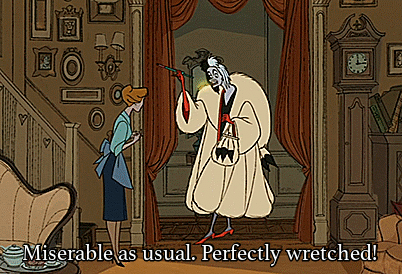
Never before was there a song that described audiences reaction to watching Patrick living in his daily life and hearing his thoughts better then this one.
Cruella De Vil Cruella De Vil If she doesn't scare you No evil thing will To see her is to Take a sudden chill Cruella, Cruella De Vil
The curl of her lips The ice in her stare All innocent children Had better beware She's like a spider waiting For the kill Look out for Cruella De Vil
Pennywise (Both): You’re Only Second Rate (Jafar, Return of Jafar)
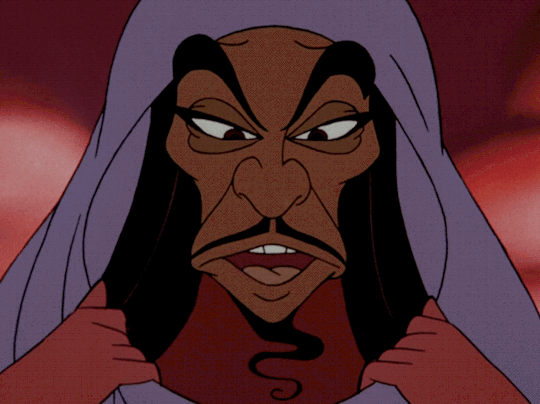
Mostly for the video and Jafar’s energy in this scene actually XD So many transformations, so many tasteless puns! I was going to give this to Freddy but its the closest thing to Penny I could think of.
Go ahead and zap me with the big surprise Snap me in a trap, cut me down to size I'll make a great escape It's just a piece of cake You're only second rate You know your hocus-pocus isn't tough enough And your mumbo-jumbo doesn't measure up Let me pontificate upon your sorry state You're only second rate
Sheriff Hoyt / Charlie Hewitt: Hellfire (Judge Claude Frollo, Hunchback of Notre Dame)

A nasty filthy man who think’s he’s in the right despite being the biggest creep and monster ever? Mhm.
*Note: I honestly didn't notice the deformed baby, Quasimodo/Thomas link until the day after I wrote this. Don't know how I feel about it. I mean, Hoyt is actually nice, in his way, to Thomas so the connection isn't totally there but onwards:
Beata Maria You know I am a righteous man Of my virtue I am justly proud
Beata Maria You know I'm so much purer than The common, vulgar, weak, licentious crowd
End of Post! 🌼
(Bonus’ under the cut)
I did think of other connections which I obviously didnt landed on but still have merit! Here!
Billy Loomis and Stu Macher: ‘Gaston’ was considered, but that would have just been a joke XD I don’t think Stu is quite as obsessed with Billy as LeFou is with Gaston.
Chucky: Friends on the Other Side. Obviously! That link was actually what inspired me to make this post. In The Dark of Night fits to a T though.
Freddy Krueger: You’re Only Second Rate! Ah, its perfectttt. But No More Mr Nice Guy fits better. If I ever do a Slashers as Disney Villains post, he’ll be Jafar for sure. Or Hades. Or Scar. Or Oogie. Probably Hades. You know what? Without the gore and blood and explicit sexual references, Freddy could be a Disney Villain himself. Its not like Disney hasn't towed the line before with perverted villains. >_> (Jafar and Frollo)
Jason and Pamela Voorhees: Mother Knows Best! Of course.
Jennifer Check: Love is For Peasants (Barbie Island Princess) Because Jennifer thinks like this:
Men? <<< Literally anything else.
Patrick Bateman: How Can I Refuse? (From Barbie Princess and the Pauper) XD If Patrick were a kids movie villain, he would totally join the ranks of corrupted usurpers pretending to be trustworthy royal advisory staff. Also ‘Let It Die’, that little interruption part of another song that O’Hare sings in the Lorax and ‘How Bad Can I be?’.
#Sheriff Hoyt#Charlie Hewitt#Pennywise#Patrick Bateman#Pamela Voorhees#Norma Bates#Midnight Man#Michael Myers#Mayor Buckman#Granny Boone#Jennifer Check#Jason Voorhees#Inkubus#Freddy Krueger#Drayton Sawyer#Chucky#Charles Lee Ray#Chop Top Sawyer#Bubba Sawyer#Nubbins Sawyer#Disney Villain Songs#Disney Villains#Disney Songs#Horror Villains#Slashers#Slashers / Horror Villains as: Animated (Children’s) Movie Villain Songs
188 notes
·
View notes
Text
Last Days of Rudolf Rassendyll, or The Two Kings (2018)
By JOHN TAN
My twice-told and enhanced version of Anthony Hope’s sequel (to A Prisoner of Zenda, 1894) i.e., Rupert of Hentzau, 1898, of which, by introducing materials for this new, rebuilt book, I tender some little hopes in making it a fuller, a more rounded, and better one!
Edited and translated excerpt from a Parisian newspaper (page 4, upper-right hand corner, originally written by Mdme. Maisie Kumaraswami -Gautier)
“July 7, PARIS: A startling discovery in the Bibliotheque nationale de France archive has raised the question and distinct possibility that the last member of the House of the Elphebergs, King Rudolf V, might have not been buried in Strelsau of which the annals of Ruritanian history had so proudly recorded. As news of this finding was broached and announced to the public it caused all the principal town-gossip at London this morning, and deep speculations in the county of Wessex, England, and also abroad, particularly, in Ruritania as public interest it had stirred deepens with regard to the extraordinary role an almost totally obscure Englishman might have played, in the history of this central European sovereign nation a hundred and thirty-five years ago.
According to the assistant head-librarian of the British Library and leader of the research team, Sir Philipp Antony, who had been tasked with unearthing and cataloguing documents relating to noble families in that eventful age, some thirty-nine letter-sized note-papers and scraps of faded writing addressed to Capt. Andy Drinkwater, commander of the frigate H.M.S. Scheherazade, which had come to light recently, have been proven by a leading expert, the assiduous demonstrations of M. Lelarche, and the brilliant and talented Cherokee graphologist, Mrs. Leonora Bakersfield of Cambridge, Mass., to be by Rudolf Rassendyll’s hand; himself the junior scion of Lord James Haydon Gordon Rassendyll, the eighteenth Earl of Burlesdon; pointing to evidences of a secret intrigue orchestrated against the Ruritanian Queen, Flavia 1 as the year waned in flaming, gorgeous colors in 18-- shortly before she herself ascended the throne in her own right, as, disclosing, over and over again, sterling proof, furthermore, that the white bones that lie within the Elphberg Family Vault, in the Cathedral of Saint Theodosius, Strelsau, instead of the hallowed ones belonging to the last of that illustrious line, comparable and as steeped in monumental exploits and majesty as the Bourbons of France and as famous as the celebrated Plantagenets in England, was but that of the English gentleman: Rudolf Rassendyll, whom we had referred to.
‘It is, further, a salient point to note and not difficult to trace the ad posteriori argumentation,’ the historian noteworthily elaborates, ‘since these yellow sheaves of papers were laid out almost like a complete manuscript, with additional materials, edited and expanded by a Colonel Hoffman Sapt and some brief lines and even paragraphs, appended, that certainly must have proceeded from the pen of King Rudolf V’s wife and successor, Queen Flavia 1, herself. Her beloved Majesty, as everyone is well aware who is knowledgeable or interested in European history, was blessed with a fortitude of mind and strong healthy constitution that had allowed her to reign for forty years after her husband’s death, after which the state became a republic. These obscure but now extraordinary and valuable papers,’ Sir Philipp disclosed, ‘had been acquired by the French antiquary, Robert Jacob Millais, some twenty years ago together with miscellaneous paintings, family portraits, old-fashioned costumes, scrapbooks, folios, first editions, quartos, and very ancient, leather-bound books, from Wickenham Castle, with a view giving to the north, hard by Nettle-Heath, and rising up from the south bank of the Meadowsweet, in South-western Wessex, without anyone delving into them, but how have they come to be placed and collected in the same bundle, are now ongoing subject matters to intrigued theorists; specialists as well as amateurs, and of further inquiry.’
Since this very important discovery was deemed to possess hallmarks of a captivating story, Sir Antony has also declared in an earlier interview with a correspondent of The Evening Standard that besides it warranting corroborative forensic investigation, he intends to place this rare treasure with a novelist, who is to whip it into shape for consumption; for to deny the general reading public and interested parties a tale of high romance recounting mighty deeds of derring-do and many plausible heroisms, in our British historian and researcher’s own words is ‘sheer idiocy, and not to be contemplated, because it’s utterly wrong, an in-advantageous and ill-advised thing to do, since the facts have it in themselves cogent truths regarding the actors in the unfolding drama such as those that have already been mentioned; also, Count Fritz von Tarlenheim, Lieutenant Benenstein, the Count of Luzau-Reischenheim, and perhaps, even more so, that most audacious swash-buckling arch-villain, that demi-devil, young, laughing, irreverent Rupert of Hentzau, all of which, are begging to be told of; preposterous and absurd and hardly credible as though it might be, to a pure-blooded Ruritanian who might have chosen to believe otherwise, instead.”
1: The recent past and home reminiscences
(RUDOLF RASSENDYLL’S NARRATIVE)
I, RUDOLF RASSENDYLL, beseated on a crowfoot and gilt chair in the Palace gardens, hereby, continues his account from where he had left off regarding his adventure in the simple semi-rural setting – rural, I mean, as compared with booming industrial nations like England, France and Prussia, where the Great Industrial Revolution is progressing in full swing – this laid back little, secluded State, far away from great city centers, those economic powerhouses of Europe, by which, I mean, this land-locked and mountainous sovereign country of Ruritania; where, lately, I had brought a great part of my sojourn, and unique experiences, close towards their successful conclusion. My ears could detect my borrowed pinchbeck watch ticking in my fob, softly and dully, and before daylight, it is my desire to quit the same country for a long time to come. The wind was blowing and ruffling the hair at the back of my head, as quill in hand, I am looking over what I had just written concerning my antecedents and my important reason for being at Ruritania this second time around, whereas, I had heretofore vowed to myself never to set foot on her dear soil again! This is not only to acquaint those whose good fortune or a mischance had allowed these papers to fall into his hands, but, by employing these broad strokes I am hoping, also, to afford a slight sketch – an insight, into my own Englishman’s heart, mind, and soul through self-revelatory disclosures that I have been setting down, that very central idea -- being, I am uniquely the man I am, myself, today, -- because my father had been my father!
The recollection, as it comes afresh now to my mind was that in my childhood and youth I had entertained a strong wish that my father come around. Even when understanding that I was faced with too great a probability that the man never could, because, he was adamant not to do so, I am given, even now, to think he never will. Indeed, I have given up this hope a great many years ago: so in truth what could I do with regard to our derailed, problematic father-and-son relationship but wisely blot all or any recollection of the man out entirely? There were times I was completely baffled because I was constantly and repeatedly disappointed due to his attitude, which was, it was okay for him to force us, trick us, or to coerce us, into accepting his blatant half-credible lies and last word in having his way in everything concerning us; which, in my memory today, I had pictured him as burying his nose in his own affairs at his desk while, at the same time, never showing any concern for and ignoring our desperate needs; therefore, treating us with so much impunity that t’was as if it was the deuced right and authority of his parenthood to deny us of everything – my brother and myself, I hereby mean!
‘Because I said so,’ was the implied or explicit message behind his every look, his every cold utterance and distant father’s gesticulations; for grown older, white-haired and stiffer, due to the attacks of gout later, he only noticed us when he wanted something from us: he knew very well how to enforce upon us our obedience that had been owed to him. The rest of the time he cut me dead. Every time he lied, give cop-out excuses or tell implausible tales that we could drive a post chaise, nay, even a locomotive through, he cut me dead. Indeed, I shudder to think what would happen if I had succumbed to the subtle influence of this distant, unpaternalistic, towering figure that dominated and ruled me: yet, my failure to understand altogether why he had found it impossibly hard to give me his love remains to this very moment! Thus, I developed a very simple and basic rule how I am to interact with my fellow human beings: that is to love and have plenty to do with those who need and love me and whom I love and need. It’s a code of conduct I wholly subscribe to; which is, if people do not need me or do not want to give me what I need I tend to have very little to do with them. I shy away from them: but, of course, not everybody should give everything I want to me; nor should I give and not care to receive! But, I believe, when every child observed a parent's face constantly sour, he had never realize he was so thoroughly a dependent until then: and soon, and strangely enough too, he ceases to ask anything that he genuinely wants or needs; and from then on their relationship would break down and it would always be like that. He would devolve his interests upon himself and even ceased to ask himself why. In my particular case, Lord Burlesdon in addition also taunted me by giving me a nickname ‘Sans argent agency’: which, I condescended, knowing my position that I had no inheritance from him to look forward to. I think from my earliest days I had developed an affinity with the helpless and the disadvantaged in that my greatest need is to be needed and I need to give as much as to receive. My place in the world, being in the midst of people, I deem it a blessing with regard to my peculiar environment because it had taught me well to relate as equals with people who are socially of a class below me, while, concerning my dealings with my superiors, I know how to show them deference and respect and maintain our relationships on easy, cordial and friendly terms.
My father was the Eighteenth Lord Burlesdon which is a hereditary title bestowed long ago by Elizabeth the First of the House of Tudor in 1583, and I am his second son. My brother, Robert, was the heir to all my father’s estates, revenues, chattels, miscellaneous properties, and sizeable and productive lands. I was packed off to Eton shortly before my seventh birthday and succeeded in distinguishing myself in going through the public school system. My father passed away six years ago; and Robert had therefore entered into his inheritance six years since; but I often thought of my late old father as still alive and of the present. He haunts me still in a strange way in all I do through a reflexive mental action which colors my every motivation, deed and thought and even personality and temperament by arousing a strong moral sense: something which I am happy to relate, also affects the new Lord Rassendyll of Burlesdon to a certain degree by us doing the opposite to what our deceased father would do. W.W.O.F.D.? What would our father do? is our moral yardstick we measure our actions, by following its precept in reverse. When A Prisoner of Zenda was begun, it had been in a semi-comic tone of humorous raillery, but, not so, in this sequel with which I continued my story left off from those days in laying bare the truth concerning myself, also, about all those whom I have left behind in Ruritania at the end of that same book, especially my little, sweet darling Flavia, who is now the real King Rudolf’s wife and belongs to him. To pick up from thence, my unrest following my decision to leave my beloved and return to England to take up the old life was indeed plummeting my soul to distraction, as most would have expected; in which an unabated chain of rhetorical questionings would at unexpected moments and even incontinent ones harass my thoughts and mood: ‘So, -- what if I was Flavia’s hero, everything she would like me to be? What am I to be, without her forever? What am I – to lose this love of mine?’ Though at first, I was excited by the reaction brought by my strong and noble resolve: and then, I was piqued. For, I had known nothing about or anticipate the sorrow of not seeing her tomorrow – and tomorrow – and tomorrow! Whether, a skein of swans was flying across the sunlit sky of a glorious warm and bedewed morning or whether it was pouring weather, there would be no Flavia to greet me with her sweet and beautiful smile, and sweeter, angelic and gentler words! She still turns me inside out, you see, and I could not get over her.
And then, in my thoughts I would ask myself as the rascal Detchard and the four others had been to Black Michael, am I to also be an unquestioning conformist? For, you see, these people were still lodged inside my brain, though all of them are dead except Rupert of Hentzau, who is very much alive, and then I had a feeling stealing over me that before everything was said and done, we must cross swords once again! Especially, as lately, there were reports in the newspapers that Rupert’s cousin, the Count of Rischenheim had been making waves at court and is showing himself almost too preeminently to be at Rupert’s beck and call.
But I am not a political man and the discrepant values of most unsavory politicians often left me high and dry. Though my father’s character and the self-serving, arrogant or devious men of the world who seek self-aggrandizement in Britain ought to have prepared me for living in the real world, my encounter with the expedient Duke Michael and his black-hearted cohorts was still something of a shock, for, something deep inside me had made me chafe and rebel with regard to their point of view, somehow! A spirit of chivalry and gallantry, having been stirred in my breast, I was longing for a nobler, bygone age other than this one of appreciating value of the Pound Sterling and ever-increasing prices of iron, beef, foods, timbers, fabric, household goods, imports, animals, and coal, that my heart gave me no rest. It was in responding to this impulse that I took my own initiative, when Sapt took me in hand and laid before me the role of a King for me to play when I first came to Ruritania; so, unsurprisingly, to me, my morals had to be brought to the proof when I had to exert self-control at certain crucial times to overcome these fleeting temptations; but, because, I can say I held my ground well, today, I can hold my head high!
In Ruritania, I was in the midst of an organized and cohesive social system as to be among noble aristocrats whom I admired and who had shouldered their responsibility well – like old Sapt and young Fritz – and these friends had, as a result, boosted my courage and underscored my altruistic motives. I was thus able to bring to the fore what was deep inside me, well beyond our own home ground context which made me understand the nature of a mature conscience and what it is to be a Christian in name and in fact. I was, therefore, proud that, in the end, I succeeded in bringing lasting honor to my family name and elevated those of all foreign English gentlemen in their regard though my deeds still had to remain a closed book to the eyes of the world. Be it as it may, I would like to point out -- though many times I yielded to the friendly pressure of these Ruritanian friends of mine, dear friends, whose remembrances are ever sacred to me -- I was thoroughly and fully myself and informed of myself: and Colonel Sapt, that old guard, has been and still is the shrewd and astute servant of the old European aristocracy, which had seen its hey-day. He had accorded me the respect due to a real hero of past ages by treating me as one, despite his tough-as-nails character and personality, and blunt, abrupt manners, though he always tried to hide this from others. They still had believed in manly heroism and gentlemanly gallantry as in England, though here, as elsewhere, the breed is slowly dying out. The new style of conduct – its diametric opposite – is embodied and fleshed in young Rupert, who, for his part in imprisoning the King has been banished from his own country only to return on pain of death; while his estates’ revenues had been impounded by the authorities, and so he is persisting in his feuds because he hated losing his incomes which had once been his and he cannot fail but to countenance vengeance. Fritz, himself, it was who had kept me informed on the latest developments and currents in Ruritanian politics and furthermore I have the habit of perusing the London and foreign newspapers. Flavia never wrote at all.
Therefore, from Fritz it was, I learned news of her. His letters were usually brief and succinct in details and generally about things of his social milieu, our friends, politics, and on a rare occasion or two – conveying in a quaint expression about the Queen’s well-being that had left me to grasp at its deeper meaning. As more letters came it became apparent that I was unforgettable to her too. But I could not come to her and she couldn’t come to me, being married to King Rudolf; and as we cannot change the moral law or play the deuce with public opinion – certainly, never either! -- there was no helping it. That was that!
I had spent last summer in our capital, and was rather tired of the interminable roar of London’s endless streets, its drifting music-hall ditties and hubbub, its huge, almost faceless crowds of people of every country and description; surging along the asphalt and its continuous flowing of vehicular traffics – cabmen, coaches with livery, heavy-laden dray horses, carts stacked with casks of ale and whiskey -- its odors from its private warehouses, public granaries, and arms manufactories, its redolence of eatables, and whatnot – so that even Italian and German operas, or evening bouts with Bohemian acquaintances in Soho -- did nothing to rejuvenate my jaded soul, nor did all the scientific exhibitions, philosophical inquiries in books or discussions in salons, conversations with the Literari, flower-shows, fetes, pamphlets, the Exchange, visits to museums and libraries, pleasuring in or along the River Thames, and every kind of activity that a man could think of to feed his senses! so that, Rose, my brother’s wife made the brusque remark that I looked strangely out of sorts and had developed a hangdog look. For a while, I had written and published poetry, as she suggested, and had interested myself in the art of photography, until, in trying to pander to my wandering fancies, she would often invite me to dine with Robert and herself at their many clubs and in fine restaurants all over the city, and afterwards, off to the West End theaters, but that too failed miserably. My brother observed that I needed a woman in my life to get out of my irregular existence and to make my paramour the first agreeable-looking, fresh-faced young girl which I was ready to fall in love with. I had developed a habit of wearing double-breasted, exceeding high collars: gray and brown twill jobs, in short: which were all the rage of high fashion: decked out with silver buttons, white silk waistcoats, and red or navy-blue cravats, together with black satin breeches and trousers and highly-greased top boots, and on my head, a black top hat, and was always seeking to replenish my wardrobe, my shoe-rack, hangers and stands with these; and appearing before raucous company (which I realized now I abhorred exceedingly) with both arms perpetually akimbo or trust deep into the pockets of my coat’s skirt; or a white kid gloved hand resting nervously under my chin, while be seated on a divan, taking no part in the conversation; I had been, in fact, fast losing my tact and high social polish. The Nineteenth Lord Burlesdon and his chic, pretty socialite wife did not in any basic and fundamental way have any need of my presence and, truth to tell, they really like me to stay with them a few months every year but I saw no point to impose myself upon their generous hospitality. When I was lodging with them, it was sufficient, they always go out of their way to be kind and making me comfortable and to be agreeable in intimate, heart-to-heart-talks; but I understand they have their own life of high society to live which kept them continuously busy; hence, according to my own principle, I don’t want to be around them all the time. Robert even charged me, one day, months ago, to marry the first beautiful woman with a long purse that I took rather a serious fancy to, to cure my phlegmatic humor and ‘stammering replies which had plagued me ever since I returned from that European excursion’ some years ago,-- as our observant Rose had bluntly put it.
My reasoning went, ‘Who has a need for me?' The answer was automatic without hesitation or any need to speculate, ‘The one who loves me! – The one who cannot live or exist without me. – Someone whose life is rendered utterly meaningless and without joy and air without me!' Are there any such persons in England? No! Where is this person? In Ruritania! Who is this person? Flavia!
Flavia! The reader does not know the thrill the sound of that name awakes in my heart. Flavia! If I could only see her one last time, the bitterly cold nights would have been better. To know that she still loves me after all this time was sheer torture in regard to what she has to endure; and to know that she still endures it every day, -- why it fairly drives a full-blooded man fairly insane with pain! Oh, the sheer waste – the sheer waste of good love!
Each correspondence I received from Fritz was wildly anticipated: I would be in a fever of emotional delirium before I receive the promised next one. When the first one of great significance came very cordially worded, I plumbed its meaning behind his salutation with its references to the Queen that had been conveyed through his pen. Three months later, the second similar letter arrived bidding me to come to Dresden at such and such a date and on such and such a train. ‘The Queen has something for you,' the message detailed. And I was also given to understand that Fritz would come this time himself and play the role of royal courier. Also, I was advised to be careful and to be circumspect; for he warned me that the enemies of Ruritania had a network of spies about.
To all Ruritania’s citizens it had been the King who had triumph over his half-brother, Black Michael, and the Duke’s hirelings for none of the part I played could be rightly ascribed to me. Hence, I would go to Dresden once again: and once again, on the same pretext to go to see the pictures and I had caught myself thinking that despite Fritz’s cautionary words being close to the Ruritanian border would do my languishing soul a world of good! Yes: I will once again be an unknown and nondescript fellow, yet, fully resolved in not failing to take every necessary precaution so that the Queen’s good name and reputation mightn’t be jeopardized – because, undertaking her plan will no doubt entail no mean risk with regard to her position.
However, at the back of my mind, memories of my deceased father haunted me. He was only half an honorable, upright, and blameless man but assumed semblances of all these to outside people; but, to my mother his true husband-like honor was punctilious: thus, ironically, in this I truly admire his lights, and so likewise, I told myself, enthusiastically, I must -- I will -- be good and upright. For, regarding being faithful to his marriage he was a towering man without any trace of any nonsense whatever about him. But, otherwise, will my father come around this time, I wonder?
3 notes
·
View notes
Text
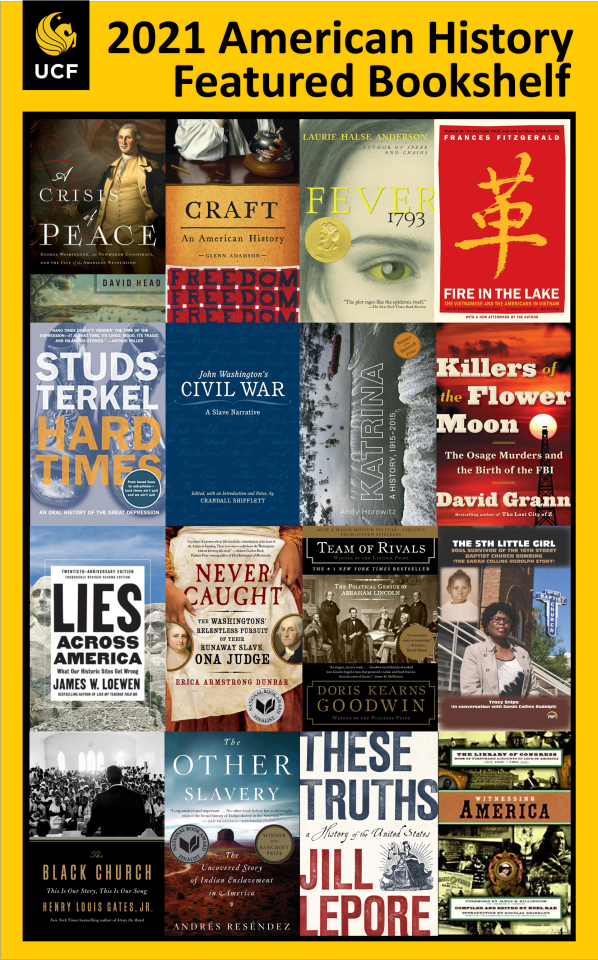
How do we define American history? Who decides what information is important to study and remember? Do we only look at the ‘good’ or lionize notable figures by placing them on pedestals and forgetting they were only human? Or do we do the hard work of studying primary sources and reading about all the facets of historic American figures? Do we learn about past mistakes and hidden horrors so we can prevent them from happening in the future?
As an academic library, UCF Libraries is committed to not only teaching our community how to do their own research and providing scholarly resources but to broadening our own horizons and looking critically at our national past. After all, America is us, the people who live, work, dream, hope and endure on these shores. It is shaped by our ideals and grows as her people do into the future we want for ourselves and future generations. The American dream is not static; it is what we want it to be.
The more informed and engaged we all are as citizens, the better our country becomes. To help with being informed, UCF Libraries has suggested 16 books on American History. Keep reading below to see the full list, descriptions, and catalog links for the featured titles on American History suggested by UCF Library employees.
For members of the Knight community looking for ways to get involved are many options available:
Volunteer in local communities. VolunteerUCF can help you connect with an organization.
Join a student group to make a difference here at UCF. The Office of Student Involvement has a list of almost 800 student organizations that can meet any interest.
Connect with your federal, state, and local representatives. You can let them know your opinions on pending legislation, volunteer, or even thank them if you think they’re doing a good job. Don’t know who your legislators are? Check out this list at USA.gov.
Most importantly, if you haven’t done so already, register to vote. If you have voted in previous elections, confirm you are still registered. Find details for how to register in your home state at Vote.gov.
A Crisis of Peace: George Washington, the Newburgh Conspiracy, and the fate of the American Revolution by David Head On March 15, 1783, General George Washington addressed a group of angry officers in an effort to rescue the American Revolution from mutiny at the highest level; the Newburgh Affair, a mysterious event in which Continental Army officers, disgruntled by a lack of pay and pensions, may have collaborated with nationalist-minded politicians such as Alexander Hamilton, James Madison, and Robert Morris to pressure Congress and the states to approve new taxes and strengthen the central government. Fearing what his men might do with their passions inflamed, Washington averted the crisis, but with the nation's problems persisting, the officers ultimately left the army disappointed, their low opinion of their civilian countrymen confirmed. Head provides a fresh look at the end of the American Revolution while speaking to issues that concern us still: the fragility of civil-military relations, how even victorious wars end ambiguously, and what veterans and civilians owe each other. Suggested by Cindy Dancel, Research & Information Services
Craft: an American history by Glenn Adamson Adamson shows that craft has long been implicated in debates around equality, education, and class. Artisanship has often been a site of resistance for oppressed people, such as enslaved African-Americans whose skilled labor might confer hard-won agency under bondage, or the Native American makers who adapted traditional arts into statements of modernity. Theirs are among the array of memorable portraits of Americans both celebrated and unfamiliar in this richly peopled book. As Adamson argues, these artisans' stories speak to our collective striving toward a more perfect union. From the beginning, America had to be-and still remains to be-crafted. Suggested by Megan Haught, Student Learning & Engagement/Research & Information Services
Fever, 1793 by Laurie Halse Anderson In 1793 Philadelphia, sixteen-year-old Matilda Cook, separated from her sick mother, learns about perseverance and self-reliance when she is forced to cope with the horrors of a yellow fever epidemic. Includes discussion questions and related activities. Suggested by Peggy Nuhn, Connect Libraries
Fire in the Lake: the Vietnamese and the Americans in Vietnam by Frances FitzGerald Originally published in 1972, this was the first history of Vietnam written by an American and won the Pulitzer Prize, the Bancroft Prize, and the National Book Award. With a clarity and insight unrivaled by any author before it or since, Frances FitzGerald illustrates how America utterly and tragically misinterpreted the realities of Vietnam. Suggested by Sophia Sahr, Student Learning & Engagement
Hard Times: an oral history of the Great Depression by Studs Terkel In this “invaluable record” of one of the most dramatic periods in modern American history, Studs Terkel recaptures the Great Depression of the 1930s in all its complexity. Featuring a mosaic of memories from politicians, businessmen, artists, striking workers, and Okies, from those who were just kids to those who remember losing a fortune, this work is not only a gold mine of information but a fascinating interplay of memory and fact, revealing how the 1929 stock market crash and its repercussions radically changed the lives of a generation.
Suggested by Sophia Sahr, Student Learning & Engagement
John Washington's Civil War: a slave narrative edited by Crandall Shifflett In 1872, just seven years after his emancipation, a thirty-four-year-old former slave named John Washington penned the story of his life, calling it "Memorys of the Past." One hundred and twenty years later, historian Crandall Shifflett stumbled upon Washington's forgotten manuscript at the Library of Congress. Shifflett presents this remarkable slave narrative in its entirety, with detailed annotations on the mundane and life-changing events that Washington witnessed and recorded. Suggested by Cindy Dancel, Research & Information Services
Katrina: a history, 1915-2015 by Andy Horowitz The Katrina disaster was not a weather event of summer 2005. It was a disaster a century in the making, a product of lessons learned from previous floods, corporate and government decision making, and the political economy of the United States at large. New Orleans's history is America's history, and Katrina represents America's possible future. Suggested by Richard Harrison, Research & Information Services
Killers of the Flower Moon: the Osage murders and the birth of the FBI by David Grann Presents a true account of the early twentieth-century murders of dozens of wealthy Osage and law-enforcement officials, citing the contributions and missteps of a fledgling FBI that eventually uncovered one of the most chilling conspiracies in American history. Suggested by Sandy Avila, Research & Information Services
Lies Across America: what our historic sites get wrong by James W. Loewen Loewen looks at more than one hundred sites where history is told on the landscape, including historical markers, monuments, outdoor museums, historic houses, forts, and ships. Loewen uses his investigation of these public versions of history, often literally written in stone, to correct historical interpretations that are profoundly wrong, to tell neglected but important stories about the American past, and, most importantly, to raise questions about what we as a nation choose to commemorate and how. Suggested by Richard Harrison, Research & Information Services
Never Caught: the Washingtons’ relentless pursuit of their runaway slave, Ona Judge by Erica Armstrong Dunbar When George and Martha Washington moved from their beloved Mount Vernon in Virginia to Philadelphia, then the seat of the nation's capital, they took nine enslaved people with them. Slavery, in Philadelphia at least, was looked down upon. There was even a law requiring slaveholders to free their slaves after six months. Yet George Washington thought he could outwit and circumvent the law by sending his slaves south every six months, thereby resetting the clock. Among the slaves to figure out this subterfuge was Ona Judge, Martha Washington's chief attendant. And, risking everything she knew, leaving behind everyone she loved and had known her entire life, she fled. Here, then, is the story not only of the powerful lure of freedom but also of George Washington's determination to recapture his property by whatever means necessary. Suggested by Cindy Dancel, Research & Information Services
Team of Rivals: the political genius of Abraham Lincoln by Doris Kearns Goodwin This multiple biography is centered on Lincoln's mastery of men and how it shaped the most significant presidency in the nation's history. Goodwin illuminates Lincoln's political genius, as the one-term congressman rises from obscurity to prevail over three gifted rivals to become president. When Lincoln emerged as the victor at the Republican National Convention, his rivals were dismayed. That Lincoln succeeded, Goodwin demonstrates, was because of his extraordinary ability to put himself in the place of other men, to experience what they were feeling, to understand their motives and desires. It was this that enabled Lincoln to bring his disgruntled opponents together, create the most unusual cabinet in history, and marshal their talents to the task of preserving the Union. Suggested by Peggy Nuhn, Connect Libraries
The 5th Little Girl: soul survivor of the 16th Street Baptist Church bombing (the Sarah Collins Rudolph story) by Tracy Snipe (in conversation with Sarah Collins Rudolph) Once described by the Reverend Dr. Martin Luther King Jr. as "one of the most tragic and vicious crimes ever perpetrated against humanity," the bombing of the 16th Street Baptist Church in Alabama, instantly killed Addie Mae Collins, Carol Denise McNair, Carole Rosamond Robinson, and Cynthia Dionne Morris Wesley on September 15, 1963. This egregious act of domestic terrorism reverberated worldwide. Orchestrated by white supremacists, the blast left twelve-year-old Sarah Collins temporarily blind. In this intimate first-hand account, Sarah imparts her views on topics such as the 50th year commemoration, restitution, and racial terrorism. In the backdrop of a national reckoning and global protests, underscored by the deadly violence at Mother Emanuel in Charleston, SC, and tragedies in Charlottesville, VA, and Pittsburgh, PA, Sarah's unflinching testimony about the '63 Birmingham church bombing is illuminating. Suggested by Megan Haught, Student Learning & Engagement/Research & Information Services
The Black Church: this is our story, this is our song by Henry Louis Gates, Jr. For the young Henry Louis Gates, Jr., growing up in a small, residentially segregated West Virginia town, the church was a center of gravity--an intimate place where voices rose up in song and neighbors gathered to celebrate life's blessings and offer comfort amid its trials and tribulations. In this tender and expansive reckoning with the meaning of the Black Church in America, Gates takes us on a journey spanning more than five centuries, from the intersection of Christianity and the transatlantic slave trade to today's political landscape. Suggested by Megan Haught, Student Learning & Engagement/Research & Information Services
The Other Slavery: the uncovered story of Indian enslavement in America by Andres Resendez Since the time of Columbus, Indian slavery was illegal in much of the American continent. Yet Reséndez shows it was practiced for centuries as an open secret: there was no abolitionist movement to protect the tens of thousands of natives who were kidnapped and enslaved by the conquistadors, forced to work in the silver mines, or made to serve as domestics for Mormon settlers and rich Anglos. New evidence sheds light too on Indian enslavement of other Indians as Reséndez reveals nothing less than a key missing piece of American history. Suggested by Richard Harrison, Research & Information Services
These Truths: a history of the United States by Jill Lepore In the most ambitious one-volume American history in decades, Lepore offers a magisterial account of the origins and rise of a divided nation, an urgently needed reckoning with the beauty and tragedy of American history. Written in elegiac prose, Lepore's groundbreaking investigation places truth itself--a devotion to facts, proof, and evidence--at the center of the nation's history. The American experiment rests on three ideas--'these truths, ' Jefferson called them--political equality, natural rights, and the sovereignty of the people. And it rests, too, on a fearless dedication to inquiry, Lepore argues, because self-government depends on it. But has the nation, and democracy itself, delivered on that promise? Suggested by Sandy Avila, Research & Information Services
Witnessing America: the Library of Congress book of firsthand accounts of life in America, 1600-1900 edited by Noel Rae Presents a portrait of America's social and cultural history between 1600 and 1900, told through letters, diaries, memoirs, tracts, and other articles and first-hand accounts found in the collections of the Library of Congress. Suggested by Peggy Nuhn, Connect Libraries
10 notes
·
View notes
Text
Platonic f/o list
Last updated: Jan. 24, 2023
Young Justice Invasion/Outsiders
Artemis Crock
Tag: #archery partner; #super team family
Wally West
Tag: #speedy buddy; #super team family
Dick Grayson
Tag: #vigilante bud; #super team family
Kaldur’um
Tag: #atlantean friendo; #super team family
Conner Kent/Kon El
Tag: #clone bro; #super team family
M’gann Morz
Tag: #martian bff; #super team family
Overwatch
Mako Rutledge/Roadhog
Tag: #hog wild friend
Lena Oxton
Tag: #tea and crumpets friend
Jesse McCree
Tag: #friendly neighborhood gunslinger
Hana Song
Tag: #gamer friend
Angela Ziegler/Mercy
Tag: #have mercy
MCU
Tony Stark
Tag: #iron friend
Steve Rogers
Tag: #super soldier bud 1
Bucky Barnes
Tag: #super soldier bud 2: winter-boogaloo
Thor Odinson
Tag: #god of thunder and friendship
Natasha Romanoff
Tag: #world’s best spy friend
James Rhodes
Tag: #rhodey buddy
Happy Hogan
Tag: #Happy buddy
Fandral
Tag: #warrior friends
Loki Odinson
Tag: #my best friend the trickster
Hogun
Tag: #warrior friends
Lay Sif
Tag: #warrior friends
iZombie
Don E
Tag: #team z
Liv Moore
Tag: #team z
Ravi Chakrabarti
Tag: #team z
Clive Babineaux
Tag: #team z
Major Lilywhite
Tag: #team z
Murder in the First
Terry English
Tag: #sfpd fam
Hildy Mulligan
Tag: #sfpd fam
Edgar Navarro
Tag: #sfpd fam
OUAT
Snow White/Mary Margaret
Tag: #princess friend
Prince Charming/David Nolan
Tag: #too charming for his own good
Emma Swan
Tag: #the savior
Killian Jones
Tag: #a pirates life
Ruby Lucas
Tag: #
Belle French
Tag: #book club bestie
Rumplestiltskin/Mr. Gold
Tag: #
Geppetto/Marco
Tag: #
Pinocchio/August Booth
Tag: #
Detroit: Become Human
Leo Manfred
Tag: #
Carl Manfred
Tag: #
Hank Anderson
Tag: #
Connor
Tag: #
Harry Potter
The Marauders and Lily Evans/Potter
Tag: #
Harry Potter
Tag: #
Hermione Granger
Tag: #
Oliver Wood
Tag: #quidditch pro bro
Angela Johnson
Tag: #
Nymphadora Tonks
Tag: #
Kingsley Shacklebolt
Tag: #
Fantastic Beasts
Tina Goldstein
Tag: #goldstein girls
Queenie Goldstein
Tag: #goldstein girls
Jacob Kowalski
Tag: #baking buddy
Arrowverse
Brainiac 5/Querl Dox
Tag: #brainy brother
Nia Nal
Tag: #best friend of my dreams
Winn Schott
Tag: #the nerdiest of friends
Mon-El
Tag: #daxamite bud
J’onn J’onzz
Tag: #martian mentor
Clark Kent
Tag: #super cousin in law
Lois Lane
Tag: #my friend the journalist
Mr. Mxyzptlk
Tag: #imp bestie
Cisco Ramon
Tag: #nerd brother
Barry Allen
Tag: #speedster bro
Caitlin Snow
Tag: #doctor bestie
Martin Stein
Tag: #uncle professor; #legends fam
Jefferson Jackson
Tag: #football bud who explains football to me; #legends fam
Mick Rory
Tag: #pyromaniac partner; #legends fam
Sara Lance
Tag: #my friend is the captain; #legends fam
Nate Heywood
Tag: #historian best friend; #legends fam
Amaya
Tag: #amulet wielding friend; #legends fam
Rip Hunter
Tag: #not a timelord; #legends fam
Oliver Queen
Tag: #you have saved this city
Felicity Smoak
Tag: #tech support
John Diggle
Tag: #the sane one
Laurel Lance
Tag: #songbird
Lucifer Morningstar
Tag: #the devil you know
DC comics
Supernatural
Jodie Mills
Tag: #mom friend
Charlie Bradbury
Tag: #dnd friend
Crowley
Tag: #king of hell frienemy
Star Trek (AOS)
Jim Kirk
Tag: #starfleet fam
Nyota Uhura
Tag: #starfleet fam
Hikaru Sulu
Tag: #starfleet fam
Leonard “Bones” McCoy
Tag: #starfleet fam
Spock
Tag: #starfleet fam
Pavel Chekov
Tag: #starfleet fam
Keenser
Tag: #starfleet fam
Jaylah
Tag: #starfleet fam
The World’s End
Andy Knightley
Tag: #my boys 👏
Peter Page
Tag: #my boys 👏
Steven Prince
Tag: #my boys 👏
Oliver Chamberlain
Tag: #my boys 👏
Sam Chamberlain
Tag: #girls night 🎉
Netflix’s Daredevil
Karen Page
Tag: #Page me when you need me
Matt Murdock
Tag: #Speak of the Devil
BBC Sherlock
John Watson
Tag: #calling doctor hedgehog
Anthea
Tag: #number 1 personal assistant
Star Wars: The Bad Batch
Hunter
Tag: #experimental best friends force 99
Wrecker
Tag: #he’s gonna wreck it!; #experimental best friends force 99
Echo
Tag: #experimental best friends force 99
Crosshair
Tag: #shootin’ straight; #experimental best friends force 99
Omega
Tag: #the brains and heart of the group; #experimental best friends force 99
Captain Rex
Tag: #captain Jane’s husband 💙
Buffy the Vampire Slayer
Buffy Summers
Tag: #slayer kids
Willow Rosenberg
Tag: #slayer kids
Xander Harris
Tag: #slayer kids
Anya Jenkins
Tag: #slayer kids
Tara Maclay
Tag: #slayer kids
New Amsterdam
Max Goodwin
Tag: #New Amsterfam
Helen Sharpe
Tag: #New Amsterfam
Iggy Frome
Tag: #New Amsterfam
Vijay Kapoor
Tag: #New Amsterfam
Floyd Reynolds
Tag: #New Amsterfam
Lauren Bloom
Tag: #New Amsterfam
OCs
Bob Cooper
Tag: #ex henchman in law
John Humphreys
Tag: #neighbor rival
Timothy Worthington
Tag: #husband’s work friend
Nancy Harolds
Tag: #heart that shines like glitter and gold
Friends with Benefits
Arthur Ketch [Supernatural]
Tag: #British Boytoy
this is currently an incomplete list
8 notes
·
View notes
Note
First of all thanks so much for all your TOG history posts! I have a question specifically about the one where you explained the continuity errors with Nicky being a priest. I like your "second son of a nobleman" Nicky that you use in your fics a lot. But I also really like the idea of a lower-class Nicky; TOG already has wealthy merchant scion Joe and literal queen Andy--i love the idea that Nicky comes from humbler origins. Is there any way to make that make sense in a historical context?
I mean, pretty much anything is possible in history? If it can happen, it probably has happened at some point, and even the broad categories and generalizations that historians apply to things are never always right in all cases, even if they represent the major trends. I obviously don’t want to shoot down people’s headcanons or ideas, even and indeed especially from my soapbox of “cranky historian complains about things on the internet.” I have personally tweaked some aspects of Joe and Nicky’s backstories that I use in my fics, since I came up with DVLA before I knew anything about the comics or any bonus content that had been released about the characters. My feeling is that since a) it’s film-verse, not comics, and b) their backstories haven’t been shown on screen and may be subject to change in adaptation, I can, while engaging in transformative fanworks, create them to suit myself. I obviously keep the broad parameters of what canon establishes, but within that space, I do occasionally nip and tuck and move things around. For example in my new AU fic, I DID make Nicky a priest as in graphic-novel canon, but that’s long since changed by the time he arrives in Jerusalem. For the fics I write for them in canon-verse, I tend to use the backstory I established in DVLA, just because... well, I like it a lot, obviously, and that was what I wrote it for. This is just because I am the aforementioned cranky historian and I rearrange the toys when I am playing with them, but my interpretations don’t necessarily have to be everyone else’s.
On that note, since you did ask for some historical context/plausibility for this headcanon, it depends (again) on how much extra story you want to invent for Nicky and how many gaps you want to fill in. Which is totally fine either way! I talked in this ask about the People’s Crusade of 1096, the involvement of unarmed/unskilled commoners in the crusades more generally, and how that would have impacted on Nicky if he didn’t have any previous training in arms. Once again, as with him being a priest, him being a low-class peasant/freeman of humble status runs into some (not insurmountable, but still extant) problems with where he would have learned how to use a sword and weapons more generally. I also obviously approve of the idea of bringing some class diversity into our historical immortals, but the son of a very poor bondsman (the stereotypical peasant in a cottage or a serf working a lord’s land) is, alas, going to have gotten into trouble in his community if he is training with a sword. (Or at least definitely raised some eyebrows, as well as questions about where he got it and how he paid for it.) As I’ve mentioned, the sword is a knight’s weapon, so if Nicky has been using it at all, he has at least enough status to qualify for that.
Happily, however, there are plenty of ways to make him not be from a rich family. As late as the end of the 11th century, aka around the time of the First Crusade, knights could still be distinguished as “free” or “not free,” and since this was before the rise of chivalry as a major social force, knights and men-at-arms were often (and indeed could be throughout the medieval era) from humble families, minor gentry, or even the working class. Chivalry made knighthood into an especial aspiration for the nobility, but not every man on a battlefield was a nobleman -- far from it. Indeed, the nobleman would call up the families who owed allegiance to him, and they could call up the families who owed allegiance to them, and so on. The definition of “knight” in the pre-chivalry landscape is a little muddy; does it convey prestige or social status, or just that someone was trained in arms? Is there a difference between that and just “man at arms” or “armed man?” For instance, at the battle of Hastings in 1066, the English army under King Harold II was composed of fyrdmen, aka regular working stiffs who had been summoned from the land (and indeed, we know they were of humble status because they had to go back and help their families with the harvest after William the soon-to-be-Conqueror had still not arrived in September), and housecarls, the professional/lifelong soldiers who served in the army as a career and were paid for their service. But we don’t always have the luxury of clear terminology for the many, many kinds of armed men who existed in various social strata in the Middle Ages.
That means, therefore, that Nicky can very easily be a poor knight, a man-at-arms of humble status who has just his sword and his armor and is subject to the vassal-of-a-vassal-of-a-vassal-of-a-lord, or other armed man of unclear rank who definitely doesn’t have money or come from a rich family. Despite the unavoidably classist nature of many medieval history chronicles, the ranks of society weren’t only king, duke, earl, and nobleman. It was a patron-and-client society, and while the king was the ultimate patron, plenty of lords of middling rank or lower would have vassals who owed allegiance to them, and vassals who owed allegiance to those vassals in turn. The word feudal, which has been so misused and turned into an (incorrect) shorthand for constant petty territorial violence, basically just means this hierarchical society of mutual rights and obligations, where (unless you were the king) you both owed fealty to someone higher in rank than you and had people lower in rank who owed fealty to you. That would only end with the serf/bondsman, who wasn’t patron to anyone. But within that, there is plenty of wiggle room to make Nicky non-noble.
This would raise the question, however, of how he was going to pay for his journey to Jerusalem. Crusade financing was a perennial problem even for kings and lords with deep pockets, and the cost of a journey to the Middle East was far, far beyond most ordinary people’s ability to cover, which is why the commoners’ crusades kept ending in disaster. (That and obviously the fact that they weren’t trained in war.) When you are traveling for months and months and have to provide all your own food, shelter, arms and armor, transportation, upkeep, etc., you would either have to have a wealthy lord paying your maintenance, have substantial private financing of your own, have sold most of your property to go (which then implies that you had property to sell), made good with a religious house who had advanced you the cash, etc. We can really go down a rabbit hole here about Duke Hugh of Burgundy making a deal with Genoa in 1192 to provision King Philip and the French army on the Third Crusade. (This is helpful since it deals with Genoa, i.e. Nicky, even if not for the First Crusade.) This covered 650 French knights and their squires and came out to nine marks a knight, which is about £6, for an overall bill of 5,850 marks.
To give you an idea of how much this is in comparative terms: in 1380, a poll tax of twelve pence per person was considered so extortionate that it helped kick off the 1381 Peasants’ Revolt. And this was two hundred years later, when wages had risen and exchange rates had increased. One pound was worth 240 pence, so if twelve pence was an exaction for your average laborer, you can see that they’d get nowhere close even to one pound. A gift of £4 to William the Conqueror in 1066 was also considered a wildly high sum. And this was all on the extremely cheap end of crusading ventures. Frederick Barbarossa, who went on the Third Crusade at the same time as Philip and the French, had expenses coming close to 100,000 marks. Crusading, in other words, was wildly expensive (often ruinously so), and either Nicky would have a wealthy patron (meaning that he was somewhat closer to the top of the heap, even if below the first rank of noblemen) or money of his own or some way to finance his journey. Which again means that he has to have some kind of background that enables him to do it. The issue with the ordinary people who went on crusade (and they absolutely did, despite various attempts to forbid them as not militarily useful) is that, as noted, they weren’t trained in arms and they didn’t have money, and when you’re trying to travel from Europe to the Holy Land under 11th-century conditions, that becomes a big problem.
So yes. Basically: you can absolutely make Nicky a person of lower rank, down to a humble man-at-arms, who doesn’t have a rich family and doesn’t come from money. But if he’s going on crusade all the way to Jerusalem -- and if he’s successful at it, i.e. we’re assuming he didn’t get killed until Joe did it the first time -- then he has to have at least enough social status that he is the direct vassal of a wealthy lord or can make some financial arrangements on his own, has been able to train with a sword, knows what he’s doing with it, etc. You are obviously welcome to invent whatever details or backstory you want for him, but alas, crusading was often the provenance of knights, noblemen, and kings for brutally practical reasons, whether economic, social, military, or pragmatic. So the further you go down the social rankings, the more logistical details you’ll have to think up for him (at least if you want to be historically nitpicky, and it’s fantasy, so you frankly don’t even have to, but hey, what do you people come to me for if not historical nitpicking?) as to how he would have trained in arms, paid for his journey, been able to go on crusade in the first place, etc. So yes.
Thanks so much for this question! It was a lot of fun.
#the old guard#the old guard meta#medieval history#history of warfare#long post#emotionallycompromisedrobots#ask
71 notes
·
View notes
Text
It also says much about Henry IV's aspirations at the beginning of his reign. For him, the raising of an army by means summoning royal and princely affinities past and deliberate political and symbolic purpose. As an enforced display of national unity, especially in the wake of the uncertainties of the early months of 1400 and the murder of Richard, it was intended to present Henry as the sole legitimate king, leading the nation in war. As a domestic manifestation arguably it succeeded at the time, but its consequences were negative. The campaign did nothing to re-establish English overlordship in Scotland. Chroniclers spoke of the enterprise in disparaging terms. It made evident the weakness as well as the potential strength of the new king. Lack of funds had constrained the length of the campaign, yet the expenditure incurred was enough to generate financial difficulties which were exacerbated by the wars in Wales which followed. The king's personal reputation as a new ruler had not been boosted: he had raised a huge army and achieved nothing, less even than Richard in 1385. There seems little doubt that failure in Scotland in the summer of 1400 encouraged others to try their luck against him. It is no coincidence that the Welsh rebellion began immediately the Scottish expedition came to a disappointing close. On 11 October, the royal council felt it wise to agree that those who were prepared to swear that they had served on the campaign should have the payments of their fees and annuities released to them. The king could not afford to alienate any who might give him military assistance in his new wars. Nor did the 1400 campaign ensure the safety of the north. When on 19 September the shire levies of the Midlands were called out to accompany the king against the Welsh, it was seen as wise to call out also the northern shire levies to assist the Wardens of the Marches against Scotland. Not until 14 September 1402 would the Scottish threat be halted, yet the battle victory at Humbleton Hill was not Henry's but the Percies', and it set in motion a chain of events that would ultimately lead to the Percies' rebellion and the near-deposition of the king. In 1400, Henry had succeeded in mobilising the political and military nation in support of his Scottish expedition and of his own royal title. But larger success, whether some memorable chivalric exploit, or a satisfactory agreement with the Scots, proved elusive
Anne Curry, Adrian R. Bell, Andy King and David Simpkin, "New Regime, New Army? Henry IV's Scottish Expedition of 1400", The English Historical Review, Vol. 125, No. 517 (2010)
#henry iv#richard ii#1400 scottish expedition#historian: anne curry#historian: adrian r. bell#historian: andy king#historian: david simpkin
5 notes
·
View notes
Text
IT Chapter Two: A Failure.
I will be criticizing the characterizations, the plot, the horror aspects and I will be comparing the film to the 1990 miniseries and the 1986 novel.
Characterization:
Ben. While he is still similar to his book counterpart, the writing for his character in the movies could have been better, because apart from being the lovesick poet and the history buff (a role which belonged to Mike in the book and in the 1990 miniseries), he didn’t get much of a characterization beyond that. In the novel, Ben was still a curious kid, who was interested in architecture and physics, and he was still a hopeless romantic, but he was not quite the poet the movies and the fandom makes him out to be, and as he stated in the book the reason why he liked haikus is because they are “structured poetry”. He was also the one responsible for building the dam in the barrens, the silver bullets and the underground clubhouse, which, except for the latter, were all excluded from Muschietti’s films. Another important moment from the novel, which was left out of the movies, was the scene where he stood up to his Gym teacher, who was complicit in the bullying he suffered at the hands of his classmates, which could have been in the second film, instead of his flashback with Pennywise, who was disguised as Beverly, a scene which didn’t provide the viewer with any new information about the character and its sole purpose was to pay homage to the 1990 miniseries.
Beverly. The movie at its worst never gets as bad as the book did, but one would expect that two movies made in the 21st century would be more progressive than a novel written in the 1980s, while certain aspects of the character were slightly better handled in the movies, it was not as good as it could have been. In the first film, Beverly is an outcast due to false rumors of promiscuity, an odd choice, because in the novel and in the miniseries she was bullied for being poor and wearing secondhand clothes, and because classism was still an issue in 1989 (the year the first film is set), it’s still is todays, so that was an unnecessary change. As was the fact that she didn’t interact much with other Losers, aside from her love interests (Bill and Ben), but perhaps the most infuriating decision was turning her into a damsel in distress and removing her role as the sharpshooter of the group. There are still positive aspects in Ch1’s treatment of Bev, she was given a personality while her book counterpart was an incredibly flat character. In the second film the scene where she is physically assaulted by her husband is played for shock value, while in the novel Beverly left her husband severely injured and he was later killed by It, in the 2019 film this scene was never addressed in a meaningful way, so it just comes across as gratuitous violence. Perhaps the best decision the second movie made regarding Beverly’s character was replacing the one-night stand she had with Bill with just a kiss to show that those childhood feelings no longer existed.
Bill. He was much better handled in the movies, while in the book the other Losers (except for Mike and maybe Stan) idolize Bill, in the movies they don’t, which makes them equals. My only complaint would be that scene in the second movie where he tells Audra that he wishes she would be like that woman he wanted. This would have made sense if they were going to stick with book arc and have him cheat on Audra, because he was still attracted to Bev, but that didn’t happen so that scene felt out of place with the rest of the film.
Eddie. He is the case of a character who was relatively well-written in the first movie, but then suffered a complete personality change in the second film. While in the first movie Eddie was brave and kind, traits which his book counterpart has, Ch2 Eddie was mean-spirited and cowardly. Most of his arc and coding was given to Richie, because the director thought that his fear of illness and relationship with his mother was enough, but he failed to realize that his fears of illness/germs and that feeling that he’s rotten are due to his internalized homophobia. And Muschietti didn’t even do a good job at handling what remained of Eddie’s arc (his fear of illness and relationship with his mother), he played it for laughs. He did not even let Eddie have agency over his death, in the novel he chose to sacrifice himself to save Richie and Bill. In the movie he still saves Richie from the deadlights, but he turns his back on It, giving the creature the opportunity to stab and thus losing any agency the character had over his fate in the book and the miniseries. He also butchered his death scene, which in the novel was when he finally accepted himself:
“Fading, fading back. Becoming clearer and clearer, emptying out, all of the impurities flowing out of him so he could become clear, so that the light could flow through, and if he had had time enough he could have preached on this, he could have sermonized: Not bad, he would begin. This is not bad at all. But there was something else he had to say first. “Richie,” he whispered. “What?” Richie was down on his hands and knees, staring at him desperately. “Don’t call me Eds,” he said, and smiled. He raised his left hand slowly and touched Richie’s cheek. Richie was crying. “You know I … I …” Eddie closed his eyes, thinking how to finish, and while he was still thinking it over he died.” (Stephen King, IT pp. 1086-7)
And Muschietti replaced that with a scene that made Eddie’s death all about Richie’s grief and changed his last words to “I fucked your mom”. All the emotional impact his death had has been completely lost.
Mike. No doubt he was the character who got the worst treatment in both movies. In the first movie, he was barely given any screen time, his role as the history buff in the group was given to Ben and they killed off his parents. In the second film, they didn’t even give him his a proper place to live in, he was just leaving in an attic, they had him steal artifacts from Native Americans (I’ll discuss that later), drug one of his friends, lie about the Ritual of Chüd being effective and he was the only Loser who didn’t even get a flashback of their own. While in the book, he was the historian, had the best parents and was one of the most important Losers. The only positive change that Muschietti made was having Mike go down to the sewers with the group for the final battle.
Richie. Even though he was played by Bill Hader, he wasn’t given the opportunity to be funny, apart from 1 impression, which was improvised. Also they removed his struggles with his sexuality in the first film, which was poorly retconned in the second film, his own bi-coding in the book was ignored and replaced with Eddie’s gay-coding (whose sexuality was left ambiguous at best), had him try to run away every 5 seconds (which something he never did in the book, he is one of the most loyal Losers), made his parents negligent just to add more unnecessary angst, because Muschietti thinks trauma = nuance. And just flattened an interesting character and took away any charm he had in the book, miniseries and Ch1.
Stan. While he was still the least developed Loser in the book, we never even get his POV, he had more character traits than just “the kid who gets annoyed easily”. In the book he was an eccentric kid with an equally eccentric sense of humor, had an interest in ornithology (completely left out apart from that puzzle), a good relationship with his parents who encouraged their son’s hobbies and weren’t as orthodox as the movies portray them. They replaced his encounter with the dead boys in the Standpipe for a painting (apparently that was Andy projecting himself onto Stan), which makes no sense because the dead kids offended him and Stan is a logical person, he would not have been scared of a painting. And they romanticized his suicide, framing it was an act of heroism, which sends the wrong message about suicide and is inaccurate, because the reason why the Losers were able to fight It is because there were seven of them, It was even scared of them. So, saying that his death was necessary to keep the Losers united just misses the point.
Issues with the Plot:
Raising the stakes to be more dramatic ended up hurting the story, while in the book the Losers’ decision to stay and fight It was one of selflessness, they decided keep a promise they made when they were eleven years old, in the second movie if they didn’t destroy It, they would end up dying, so this decision became one of self-preservation.
In the movie if they didn’t kill It, they would end up dying. This damaged the plot and eliminated the feeling of friendship, in this movie the Losers barely felt like old friends and more like co-workers. Another odd choice was to include the Ritual of Chüd, turn into a Native American ritual and portray them in a stereotypical way and it was also unnecessary to include that, because the ritual doesn’t work, so the viewer just wasted an hour watching the Losers looking for their tokens and in the end It was killed by the power of bullying. Another flaw of Chapter Two is its runtime, the movie is almost three hours along, most of the flashbacks were unnecessary and its structure is rather disjointed.
The film also fails to address important scenes in a meaningful way, while in the book the murder of Adrian Mellon was based on a real event and was included to condemn this action, the film never addressed it (it wasn’t even mentioned afterwards), instead it was played for shock value. Probably because the actual scares of this were not effective at all, instead of relying on practical effect and trying to create tension, the filmmakers decided to use CGI for all these scenes. It would have been wiser if they had only used it in essential moments, for example, when It turned into a giant spider. In an attempt to avoid the criticism the 1990 miniseries faced for keeping the spider while also trying to stay faithful to the source material, they decided to create a ridiculous hybrid, a giant clown with spider legs, whose death was caused by the power of bullying. Ironic for a movie which was supposed to condemn such a thing. What the viewer was left with was a dull, unimpressive, charmless movie, filled with problems caused by the director’s failure to understand the source material and the characters.
#I spent 2 days working on this and have been thinking about this for a year so I'd appreciate reblogs#Ch2 was a mistake
45 notes
·
View notes
Text
University Challenge 2019/20, Episode 32
As we all hunker down for the eternal winter and wonder why we didn’t start vegetable patches five years ago, it’s the perfect time to dive into the quarter-finals and pretend everything is fine outside! It’s all filmed a few months in advance, so we can gaze on the contestants who are only frowning about heritage sites and Nobel physics laureates and not societal breakdown! ‘For the losers, the tumbrels await,’ said Jez in the intro. Now I know what a tumbrel is, and how we’re all destined for it.

Jesus College, Oxford: 135
Courtauld: 90
Team Vibe: Jesus College, Oxford:

Courtauld:

Grandad Count: Sweet LORD, they’re all so young! Average ages of 20 and 21.
Gender Diversity Count: TWO! for Jesus College, Oxford! ONE! for Courtauld!

Style News: Excellent work over at Courtauld as usual, with Captain Prance’s thin tartan 80’s blazer, and any normal circumstances, Collinge would ace this, as she was bringing another glorious '80s shirt adorned with sketch-like figurative line drawings. But Jesus’ Clarke was wearing a headband with little fluffy ears on it, and this trumps everything.

Cult Hero Of The Episode: It should be Jesus’ Clarke, who was right out of the starting blocks with the first two starters and the first three bonuses, and seems to know a bit of everything, from English literature to white dwarf stars (and extra points for pronouncing Kraftwerk in German, titter). She's excellent.
But COURTAULD! Cult Heroes, perhaps? Seriously, since when did you see a bunch of hipster art historians get to the quarters of UniChall? Answer: NEVER. Easily my fave team of the season, because I am an arty-farty sort who wasn’t allowed to do art or art history at school. These guys are LIVING MY DREAM.

All hail Captain Prance, who was great tonight, covering French poets, Penelope Fitzgerald and geography and just so laissez-faire about everything. ‘Shall we say Otto the Wicked?’ he bubbled in the Caroline kings round. And fair play to him for buzzing in first in the maths starters, confidently guessing a random number in the manner that Andy and I do at home, except he has the balls to do it on national telly. He also accidentally pressed his buzzer again after one algebra question had finished. A champ!
Handsome Person of the Episode: Jesus’ Stevens is all kinds of lovely and fragrant, and also grabbed some key starters.

Horror Bonus Round: ‘Answer with an improper fraction as soon as your name is called. What is the value of the definite integral with respect to x between the limits x = 1 and x = 2 of the function y = x squared?’

Regular Music Fail By Composition PhD-owning Composer, Kerry Andrew: Andy jumped in with Saint-Saens while I was trying to remember the name of any French composer, ugh. Yes, key electronica bands, what joy! I didn’t get any, though would have got Massive Attack had Andy not pounced first.
Dream Bonus Question Round: Orchestral fanfares, PHEW! 2/3, plus 2/3 in the artists inspired by music round; I am working on a giant, three-year cross-stitch project of Mondrian’s similar Broadway Boogie-Woogie, yay!
Jezza-Watch: A baffling crypto-systems fictional character starter question: ’Alan and Steve?’ guessed Jesus’ Clarke, with a naughty expression. ‘No, it’s not Alan and Steve,’ said Jezzo, with equal campness.
Kerry and Andy’s Score: I was abysmal, with a paltry 6, but Andy was ablaze with 13; 125 points between us.
Brain Food: Roast golden beetroot and courgette, mackerel and tomato, with coriander pesto.
Tweets of the Day:




Please feel free to share, retweet, shout about this blog. I’m mostly a musician but a writer now too, and every little helps. And here’s me on Instagram.
6 notes
·
View notes
Text
Henry David Thoreau
Who: Henry David Thoreau
What: Author, Philosopher, Abolitionist, Activist, Naturalist, Critic, Surveyor, Yogi, Historian...ah, Jeez, what wasn't he?
Where: American (active largely in the US)
When: July 12, 1817 – May 6, 1862
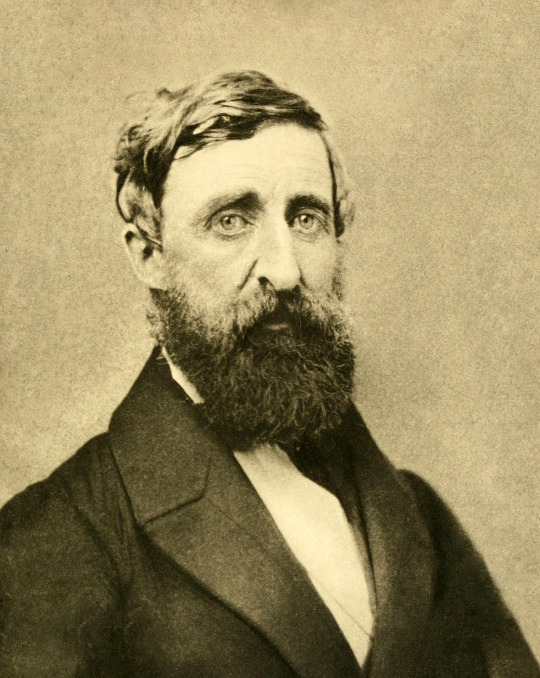
(Image description: a photo of Henry David Thoreau from 1861, it is obviously in black and white but has faded to sepia. He is a white man in a jacket and what appears to be a scarf or cravat. He has a long, tired face, circles around his eyes. He has a thick beard and mustache and slightly messy hair, his hair is dark but graying. End ID)
You have probably heard this name even if you don't know why. He is best known for his memoirs, essays, and his role in the founding of the Transcendentalist movement. His progressive philosophy remains relevant to this day. His influence has lasted well over a century and he served as inspiration for the likes of JFK, Martin Luther King Jr., Hemingway, Tolstoy, Shaw, Gandhi, among dozens of other names of equal note.
Thoreau was a Transcendentalist through and through, meaning he believed in the inherent goodness of humanity and nature in conjunction with science, and the power of the individual. His writing is generally practical, thoughtful, detailed, and observant, and he wrote extensively on a number of subjects. Perhaps most notably on environmentalism (he is one of the inspirations for and a precursor to the 20th century environmentalist movement), nature, ethics, simple living, direct action, civil disobedience, abolition, tax resistance, anarchy, among countless other topics.
Thoreau's most famous and popular works include Walden, which is the published version of of the diary Thoreau kept over his two year social experiment at Walden Pond (written beginning in 1845, published in 1854), "Civil Disobedience," which helped both Gandhi and Dr. King form their philosophies, and states that in an unjust society the just must rebel, (it was originally titled "Resistance to Civil Government or Civil Disobedience", 1849), "Walking" an instruction manual on how Thoreau thought, observed, and wrote (1862), "Slavery in Massachusetts", a speech given at a rally to protest the re-enslavement of escapee/fugitive slave Anthony Burns (1854) and Excursions, collection of essays, published posthumously in 1863 with biographical introduction by fellow author and Transcendentalist Ralph Waldo Emerson. He also wrote on John Brown and his execution ("A Plea for Captain John Brown" [1859], Remarks After the Hanging of John Brown [1859], and The Last Days of John Brown [1860]).
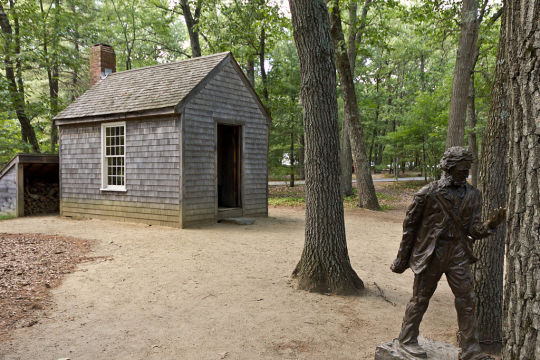
(Image description: a replica of Thoreau's cabin in Walden. It is a very small wooded. Cabin in a clearing, one room at most, brown/gray in color. It has a white multi-paned window and a brick chimney in the back. The whole cabin is not much taller than its door. Behind it is a shed or outhouse. They are surrounded by trees. Touching one of the closest trees is a brown metal statue of a man walking, presumably Thoreau. End ID)
Probable Orientation: Gay ace or possibly aroace with a desire for a male QPP.
I am very confident in Thoreau's asexuality, if a little shakier on his romantic orientation. As far as anyone knows (and his life has been repeatedly and heavily scrutinized since the 19th century) Thoreau never had a romantic or sexual partner. He was a public figure with a wide circle of friends, someone would have known at some point during his life and if somehow a partner escaped notice the historians who dedicated their lives to studying his life specifically would have uncovered them. Thoreau wrote on male/male relationships, some more platonic, some queerplatonic, some vagulely romantic, none sexual.
Thoreau, like Elizabeth I, is one cishets hold onto, turning away from the idea he could be anything but heterosexual regardless of the evidence to the contrary. Like Andy Warhol he is one exclusionists refuse to acknowledge was ace, although they have even less of an argument here. Many aphobic fans of Thoreau are terrified by the idea that maybe, just maybe, the thing Thoreau loved most was nature. Some outrageous arguments from either side include: one historian claimed a poem Thoreau wrote for a man was actually meant for that guy's sister, some say he was being hip in writing about Achilles, some say he was too repressed to have sex, especially since he was gay. One blogger got heated in his admantness that Thoreau wasn't ace but was "a human being with feelings and needs." Nice aphobia there, dude.
But here is the thing about any of those arguments: Thoreau broke every other rule in his culture. He was not afraid to be different, and separated himself from society. He was all about the individual breaking away from society and its traditions and going with your human nature. Thoreau did what he believed to be right.
He had a following, many friends and aquaintences, almost certainly suitors, he spent a lot of time alone in the company of men he seemed to find attractive e.g. Tom Fowler (who was his sole companion and guide through Maine) and Alek Therien (who visited Thoreau alone at Walden). I firmly believe that his percieved "prudishness" was not artificial but came from a genuine disinterest and failure to even really understand sexual attraction (his journals imply as much, you will see). If he did sleep with any of these men Thoreau never documented it, not even in his own journals. But what he did articulate in letters is that society's refusal to discuss sex/physical relationships was proof of its problems. Sex was natural so dismissing it wasn't.
His feelings about sex are contradictory, he thinks it must be natural but he also finds it repulsive and dirty. He makes note at one point of how beautiful pollination is (he is quoting and translating J. Biberg but agrees with the sentiment and indeed only uses the quote to prove his point on the beauty of sexless flowers), but he vilifies or dislikes human intercourse. Thoreau seems to like the idea of sex without the sex, he likes closeness more than intercourse. He wants to like sex but can't, the closest he gets is the desire for these things to be open.
Quotes:
Hang onto your hats. There are some long ones here, but Thoreau, like Chopin, is pretty overtly ace. Like he couldn't make it clear without waving an asexual pride flag, would be hard considering it was invented in what? 2010? And Thoreau had already been dead 148 chaste, chaste years.
"What is commonly honored with the name of Friendship is no very profound or powerful instinct...I do not often see the farmers made seers and wise to the verge of insanity by their Friendship for one another. They are not often transfigured and translated by love in each other’s presence. I do not observe them purified, refined, and elevated by the love of a man…I do not often see the farmers made seers and wise to the verge of insanity by their Friendship for one another. They are not often transfigured and translated by love in each other’s presence. I do not observe them purified, refined, and elevated by the love of a man…Nor do the farmers' wives lead lives consecrated to Friendship. I do not see the pair of farmer Friends of either sex prepared to stand against the world...Even the utmost good-will and harmony and practical kindness are not sufficient for Friendship, for Friends do not live in harmony merely, as some say, but in melody. We do not wish for Friends to feed and clothe our bodies,--neighbors are kind enough for that,--but to do the like office to our spirits…[the ideal friendship] will make a man honest; it will make him a hero; it will make him a saint. It is the state of the just dealing with the just, the magnanimous with the magnanimous, the sincere with the sincere, man with man.”
-Henry David Thoreau, from his journal 1839. This entry on friendship the hope for something deeper than what most people call by that name, but still looking for friendship. He is looking for a partner, an emotional, spiritual, partner. This quote could be read as romantic or queerplatonic. You know which one I am leaning toward, queerplatonic, especially because he specifies these relationships as unique from marriage (which he equates in other texts with sex and maybe romance) also he was writing while on a trip with his brother, John, to whom he would later dedicate the publication after John's death in 1842. But it could easily also be a sexless romantic relationship, what he is looking for is not explicitly either.
The following are all from 1852 letters written by Thoreau to his friend and proofreader Harrison Blake. One of these letters was overtly written on the subject of "Chastity and Sensuality" and contains his complicated feelings on sexuality:
"What the essential difference between man and woman is, that they should be thus attracted to one another, no one has satisfactorily answered."
(Note: self explanatory)
"If it is the result of a pure love, there can be nothing sensual in marriage. Chastity is something positive, not negative. It is the virtue of the married especially. All lusts or base pleasures must give place to loftier delights...The deeds of love are less questionable than any action of an individual can be, for, it being founded on the rarest mutual respect, the parties incessantly stimulate each other to a loftier and purer life, and the act in which they are associated must be pure and noble indeed..."
(Note: in the above quote he seems to believe that in marriage sex must eventually stop because there is something better. As if they have gotten the sex stuff out of the way.)
"Love and lust are as far asunder as a flower-garden is from a brothel.
(Note: this was part of his description for his disdain for human sex vs human love, his confusion about sex but love of human relationships. It is part of that desire for sex without sex thing I mentioned but harsher than his tone in a later letter.)
"'The organs of generation, which, in the animal kingdom, are for the most part concealed by nature, as if they were to be ashamed of, in the vegetable kingdom are ex posed to the eyes of all ; and, when the nuptials of plants are celebrated, it is wonderful what delight they afford to the beholder, refreshing...'"
(Note: this is Thoreau quoting and translating J. Biberg. Part of the same letter as the brothel line. In this letter he discusses how perturbed he is by sex and lust, but how it should be something beautiful. He celebrates pollination, while finding human sex distasteful, again sex without sex.)
"The intercourse of the sexes, I have dreamed, is incredibly beautiful, too fair to be remembered. I have had thoughts about it, but they are among the most fleeting and irrecoverable in my experience."
(Note: Also self explanatory)
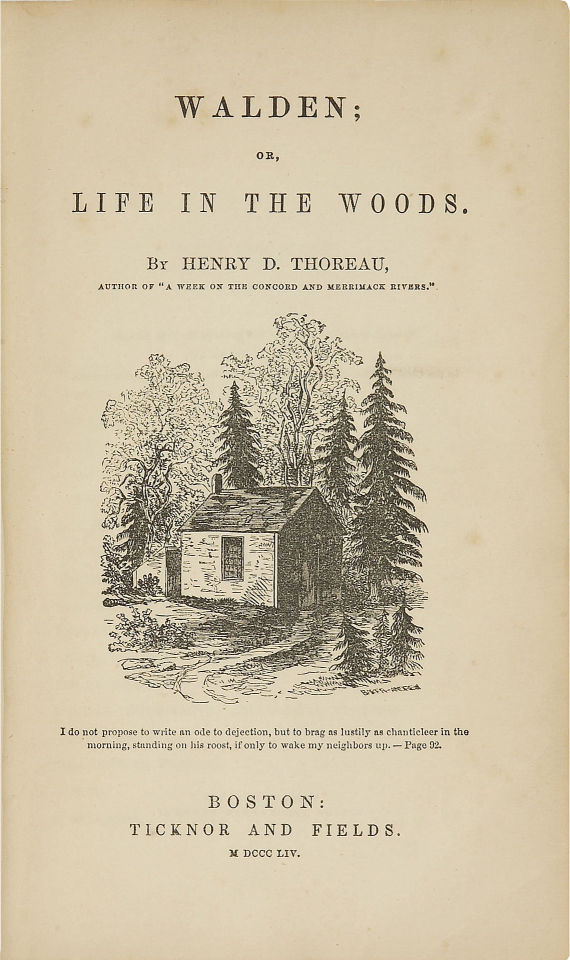
(Image description: the original title page of Walden. It has an illustration on it drawn by Thoreau's sister Sophia. Above the illustration it reads "Walden; or Life in the Woods by Henry D. Thoreau, Author of "A Week on the Concord and Merrimack Rivers". Then is the illustration showing Thoreau's cabin, it looks very much like the modern replica if with a slightly different treeline. There is a path leading from the cabin down to the bottom of the image directed at the words below. The text continues after the drawing "I do not propose to write an ode to dejection, but to brag as lustily as chanticleer in the morning, standing on his roost, if only to wake the neighbors up. -Page 92. Boston, Ticknor and Fields. M DCCC LIV.". End ID)
#lgbtq#queer#asexual#ace#history#gay#authors#19th century#american#north america#usa#aromantic#aro#activists#bio
35 notes
·
View notes
Text
2020 NAMM Tribute To Those We Have Lost Covered By Jon Hammond
#WATCHMOVIE HERE: 2020 NAMM Tribute To Those We Have Lost Covered By Jon Hammond Jon's archive https://archive.org/details/2020nammtributetothosewehavelostcoveredbyjonhammond Youtube https://youtu.be/Bmfh-b9--6s FB https://www.facebook.com/hammondcast/videos/10156569128347102/
2020 NAMM Tribute To Those We Have Lost Covered By Jon Hammond
by
Jon Hammond

NAMM Historian Dan Del Fiorentino & Suzanne Glasnapp

Topics
NAMM Tribute, Musicians, Instrument makers, Memorial, Deceased Musicians, International Music Community
Language
English
2020 NAMM Tribute to those we have lost covered by Jon Hammond FIRST LAST YOB YOD TITLE
Tony Acosta19422019Luthier String Company, FounderTracy Allen19822019Beacock Music, Music TeacherShiro Arai19302019Aria Guitars, FounderGinger Baker19392019Musician, Product EndorserKatreese Barnes 19632019Musical Director, Clinician Dave Bartholomew19182019Songwriter, MusicianRicardo Bauer19722019Bauer Percussion, CEOKevin Becka19542019Blackbird Academy, Co-FounderVinnie Bell19322019Product Engineer, LuthierBob Birmingham19452019Steinway & Sons, Former OwnerHal Blaine19292019Studio Musician, Product EndorserEric Bomba19642019Sam Ash Music, Operations ManagerBill Boyce19402019Piano Distributors, Founder Tim Boyle19482019Recording EngineerHarold Bradley19262019Studio MusicianSusan Brailove19302019Oxford University Press, Former DirectorEd Brier19402019Brier & Hale Music Co., Co-OwnerClora Bryant19272019Musician, Product EndorserJessica Bryner19852019Mackie, Marketing and Communications Fred Buda19352019Musician, Product Endorser, EducatorEllsworth Bush19332019CF Martin & CO., Foreman and SupervisorKay Calato19262019Regal Tip, Co-FounderPaul Capozzoli19292019Method Book AuthorJoe Cardinale19302019Lifelong Independent Rep.Alexis Castañeda19722019A Tempo Percussion, FounderEllen Cavanaugh19452019Super-Sensitive Musical Strings, Vice PresidentEd Cherney19502019Recording EngineerBenny Cintioli19342020Cintioli Music Center, Co-FounderMargott Cintioli19292019Cintioli Music Center, Co-FounderDick Dale19372019King of the Surf GuitarDoug Daniel19442019Harman, JBL, Senior Sales Manager Terry Dean19452019Andy Owings Music Center, Store ManagerGary DeShazo19292019Caldwell Music Company, Former PresidentMorris Diamond19212019Beverly Hills Records, FounderJune Doyle19342019D'addario Canada, Western Sales Representative
Dr. John19412019Musician, Product EndorserWilliam Dunkley19222019Dunkley Music Store, Co-FounderJim Dunlop19362019Dunlop Manufacturing Inc. , FounderJohnny Eberle19392019American Mastering, FounderPreston Epps19302019Musician, Product EndorserCharles Feilding19492019Yamaha Corporation of America, Manager of the Sound Design OfficeSteve Fjestad19502019Blue Book Publications, Co-FounderFred Foster19572019Electronic Theater Controls, Inc., Co-Founder, CEOFred Foster19312019Monument Records, FounderStuart Fraser19612019Musician, Product EndorserDonnie Fritts19422019Songwriter, Studio MusicianMark Fullerton19622019Ted Brown Music, Purchasing, Sales and Marketing ManagerDon Gayle19322019Shure Inc., Technical WriterKurt Glaesel19262019Glaesel String Instrument Service, FounderEric Goldbaach19662019EEGoes Over Productions, FounderMarty Grebb19452020Musician, Product EndorserChristopher Griffin19702019Coachella, RiggerBill Hagner19232019The Gretsch Company, Plant ManagerBob Hale19292019The NAMM Foundation's Museum of Making Music, DocentBonnie Harris19422019Harris Teller Inc., Former Officer and Director Joy Harris19402019Bill Harris Music, Co-FounderEric Haydock19432019Musician, Product EndorserBill Heese19362019Carl Fisher Publishing , Former Vice PresidentBill Heggie19432019Magnum Sound, FounderTurley Higgins19372019Yamaha Corporation of America, Concert & Artists ManagerKarl Hirano19422019Yamaha Corporation of Japan, Electronic Engineer Harry Hirsch19292019MediaSound, Soundmixers, FounderMary Lou Hoogenboom19312019Gibson Guitar Company, Factory WorkerPaul Hostetter19452019LuthierKen Hyams19272019Allied Communications Inc., FounderJoe Incagnoli19592019Fort Apache Recording Studios, Co-FounderJames Ingram19522019Vocalist, Product EndorserRichard Janda19202019Richard's Music, FounderCarl Janelli19272019Method Book Author, MusicianJimmy Johnson19432019Studio Musician, ProducerGary "Frog" Juestensen19492019Oasis Stage Werks, FounderJean Charles Juliat19422019Robert Juliat Lighting, CEOLarry Junstrom19492019Musician, Product Endorser Lewis Kahn19462019Musican, Product EndorserGershon Kingsley19222019Electronic Instrument ComposerGeorge Klein19352019ProducerJan Erik Kongshaug19442019Recording EngineerRoger Lattin19562019Studio Set Lighting Technician Robert Lee19542019St. Louis Music, Senior Vice President of SalesMatt Leff19662019Matt's Music Center, FounderTeresa Leithold19322019Leithold Music, Owner, TeacherRussell Lindquist19322019Holcombe Lindquist Piano and Organ, Co-FounderManny Lopez19272019Musician, SongwriterRoss Lowell19262019Lowel Light, FounderMike Mahoney19562019Mahoney's Pro Music & Drum Shop, ManagerJack Martin19232019Wurlitzer, Piano Sales ManagerDaniel McBrayer19322019McBrayer's Award Piano, Owner EmeritusEmily Meixell19832019C. F. Martin & Company, Custom Shop ArtistTed Middleton19442019Jet Music Pty Ltd, CFOLoretta "June Bug" Miller19562019Peavey Electronics, Cycle Counter - Warehouse Eddie Money19492019Vocalist, Songwriter Ruy Monteiro19472019Studio R Amplifiers, FounderTommy Moore19362019Kasuga International, FounderDon Mozingo19312019Mozingo Music, FounderTerry Nelson19372019Young Chang Piano, Salesman, TrainerGordon O'Hara19572019RETAIL UP!, CEO and Managing Partner Ric Ocasek19492019Musician, Product EndorserAlan R.Pearlman19252019ARP Instruments Inc., FounderMorton Pearson19222019Pearson Piano Company, OwnerAspen Pittman19482019Groove Tubes, FounderJoyce Porras19282019Reynald's Music Store, OwnerBill Powers19532018CBI Cables , Senior Account Executive Mike "Roberts" Rabuazzo19602018Connecticut Music, Co-OwnerLeon Redbone19492019Studio MusicianBill Reglein19482019jj Babbitt Company, Inc., President Emil Richards19322019Musican, Method Book AuthorJohn Robbins19642019Sound EngineerAlan Rogan19512019Touring Guitar TechSteve Rook19602019JW Pepper, Vice President of Advertising ProductionHarry Rosenbloom19292019Medley Music, FounderPeggy Rosenthal19312019Baton Music, Co-OwnerTed Ross19472019Stagecraft, Sales ManagerReggie Rugley19612019Musican, Product EndorserDave Samuels19482019Musician, Method Book AuthorRay Santos19282019Composer, Music EducatorBob Saunders19412020Kaman Music Corporation, Former PresidentJoachim Schneider19392019Joachim Schneider & Sons, FounderBob Shriver19552019Yamaha Corporation of America, District Manager of Electronic KeyboardsJohn Simpson19422019Marshall Music, Woodwind Repair Technician Jim Slutz19372019NAMMYP Founder, Music Business ProfessorBrian Smith19732019Unitas Guitars, Luthier, FounderSteve Lincoln Smith19592019Innovative Music Australis Pty Ltd, FounderGerry Stickells19422019Tour ManagerLarry Taylor19422019Musician, SongwriterRuss Thomas19412019Thomas Music, Inc., FounderPreston Thompson19562019Preston Thompson Guitars, FounderRobin Tolleson19562019Modern Drummer, WriterPeter Tork19422019Musician, SongwriterBernie Tormé19522019Musician, Barnroom Studios, FounderRon Tunks19492019RT Sales, FounderHarvey Vogel19362019Lone Star Percussion, FounderVickie Volesky19582019Yamaha Corporation of America, Former District ManagerCarl Volkwein19382019Volkwein's Music, Former PresidentCharles Walter19272019Charles R. Walter Pianos, FounderKen Warmoth19512019Warmoth Guitars, FounderMarc Weiss19412019Lighting DesignerParham Werlein19212019Werlein's For Music, Former PresidentBonnie Wilcher19492018Owensboro Music Center, PartnerKeith Wilhelm19632019Backbeat Music Company, OwnerAllee Willis19472019Songwriter Ernie Winfrey19422019Recording EngineerMac Wiseman19252019Musician, SongwriterIzzy Young19292019Folklore Center, FounderReggie Young19362019Studio Musician, Product Endorser
#Namm#2020NAMM#Deceased#Memorial#TributeSpcl thanks NAMM Historians Dan Del Fiorentino, MIke Mullens, Ashley Allison
Publication date
2020-02-07
Usage
Attribution-NonCommercial-NoDerivs 4.0 International







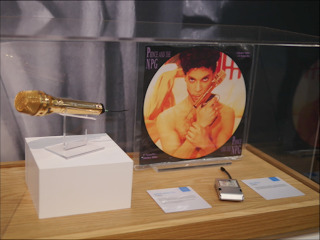



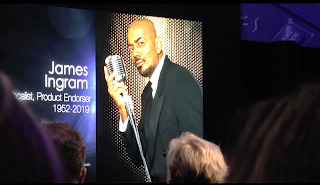



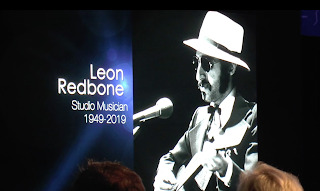
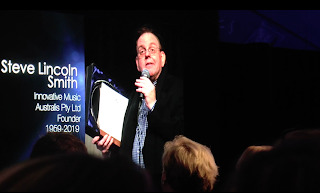


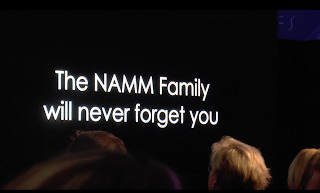


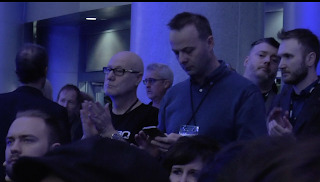

NAMM Tribute, Musicians, Instrument makers, Memorial, Deceased Musicians, International Music Community
1 note
·
View note
Text
21 Questions Tag Game
hand-me-downsRita OraRules: Answer 21 questions and tag 21 people you want to know better
@pinespittinink tagged me, thanks!
Nickname: I have a few but Nai or Absinthe are the main ones
Zodiac sign: Gemini
Height: 5′7″
Hogwarts house: Ravenclaw
Last thing googled: “Undercommon script” - I'm a DND nerd don't judge me
Favorite musicians: Florence and the Machine, Hozier, Maluma, Halsey, Haley Kiyoko, Clara Mae, Andy Black, Fall Out Boy, Katelyn Tarver,
Song stuck in head: HP - Maluma
Following: 101
Followers: 91
Do I get asks: Nope but I'm not really active on here so not surprising
Amount of sleep: eh surprisingly 8 hours but I'm still tired af
Lucky number: Don’t have one
Wearing: Faded burgundy t-shirt and navy blue pajama shorts
Dream job: Historian or history professor
Dream trip:
Instruments: Ha no.
Languages: English, Spanish, some French from high school but its fading fast
Favorite songs: This is gonna be difficult to narrow down
HP, Maluma
King and Lionheart,
Hola Señorita, Maluma
Dont Say You Do, Lola Blanc
Horns, Bryce Fox
Nightmare, Halsey
Not A Love Song, Bülow
Church, Fall Out Boy
Not Her, Clara Mae
Howl, Florence and the Machine
Girls, Rita Ora
You Should See Me In A Crown, Billie Eilish
Subeme La Radio, Enrique Iglesias
Strangers, Halsey
Random fact: I play DnD with a group of friends on discord
Aesthetic: Lavender scented candles, Worn combat boots and a hand-me-down leather jacket, Collection of unused journals piled high, Drinking mint tea in a comfy pullover and sweats, A nest of blankets and pillows
Tagging: @miiikaelson @misotheismed @the-ichor-of-ruination @concerningwolves @lasenbyphoenix @the-real-rg @sunsets-and-cigars
4 notes
·
View notes